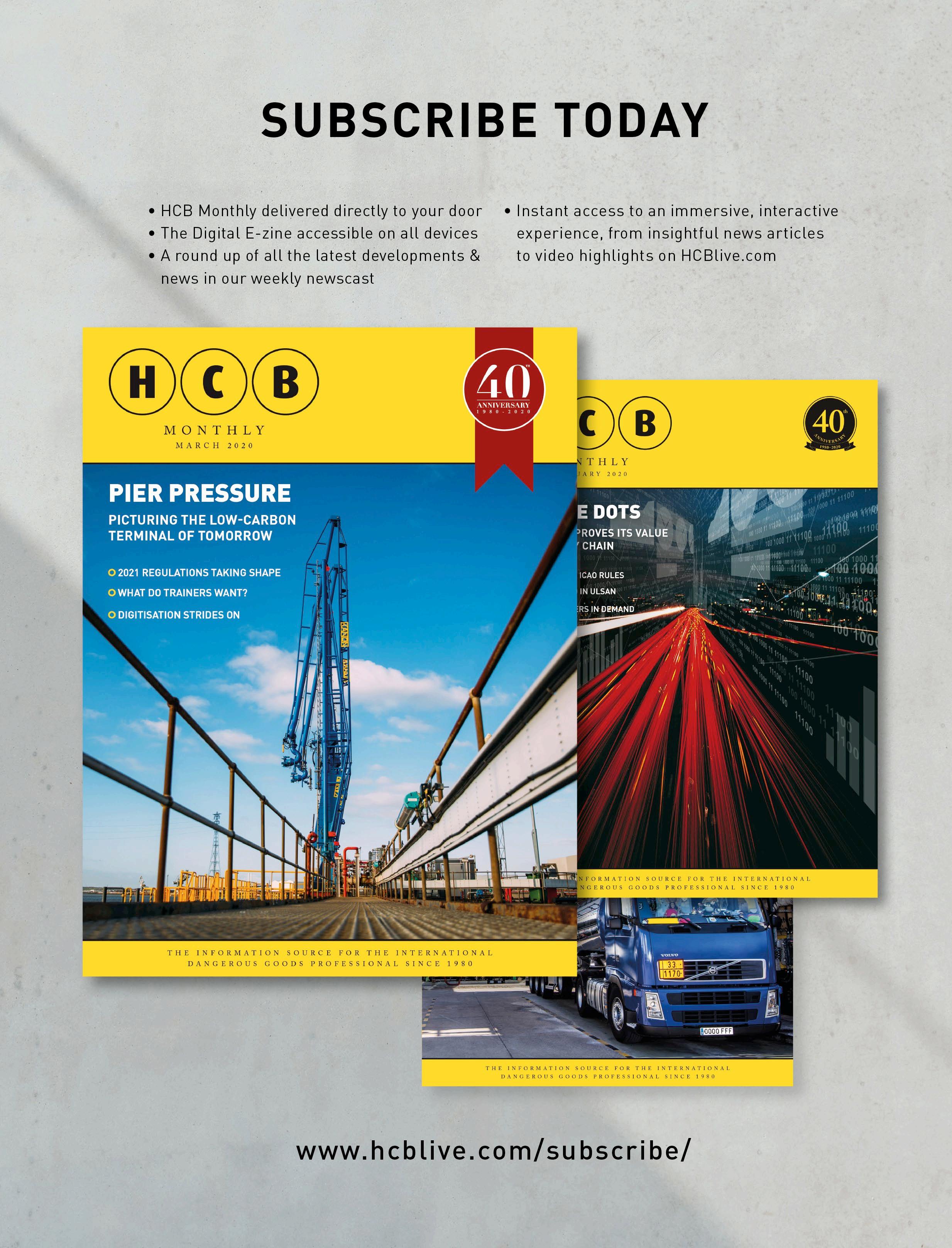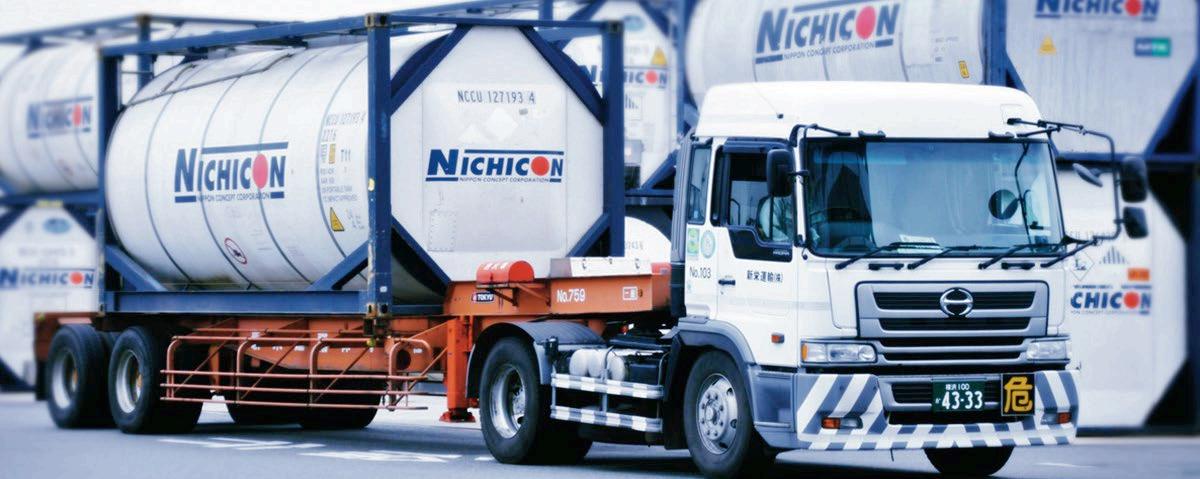
67 minute read
News bulletin – tanks and logistics
NEWS BULLETIN
TANKS & LOGISTICS
MOL, NICHICON FIRM PARTNERSHIP
MOL Logistics (MLG) and Nippon Concept (NCC) have agreed to establish a new tank container joint venture. The new company, MOL Logistics (Tank Containers), will deepen MOL Group’s business alliance with NCC, which operates under the Nichicon brand, and expand their partnership in global tank transport. MOL acquired a 15 per cent stake in NCC in 2018 and since then the two have shared overseas offices and business networks.
The joint venture will extend this business alliance and, MOL says, further accelerate collaboration in business and cargo transport operations using tank containers. “Specifically, MLG will extensively intensify its agency business on NCC’s behalf, starting in Thailand and other major Asian countries showing tremendous growth in demand for chemical products, such as China and India,” MOL says. “In addition, by leveraging MOL and MLG’s networking capabilities, MLGTC will maximise the synergetic effects of NCC’s know-how and track record in door-to-door international multimodal transport services for liquid cargoes and various types of gas.” www.mol.co.jp www.n-concept.co.jp
THIRD FOR MILKYWAY
Milkyway has formally opened its new Liaoning Kingman integrated logistics facility in north-east China. The site offers a total of 12,000 m2 of warehouse space for all dangerous goods other than Classes 1 and 7, as well as general non-hazardous chemicals. It also provides specific dust-free and temperaturecontrolled zones and a space for small samples. The facility also provides cleaning, maintenance and inspection of tank containers, rail tank cars, IBCs and other containers.
The new Kingman facility is Milkyway’s third new logistics site in China and is located on the Liaodong Peninsula, offering easy access to industrial customers in the region. Liaoning is also a vital node in the ‘Belt and Road’ strategy. It is expected to strengthen the petrochemical supply chain based around Xianren Island and covering the three provinces of north-east China. www.mwclg.com
IMT KEEPS TABS ON FLEET
Intermodal Telematics (IMT) is expanding its telematics applications with the new IMT Fleets app, which allows customers to have a clear overview of their fleets on a mobile device, with information on location and, depending on the sensors fitted, the temperature and pressure of the cargo.
“The IMT Fleets App fits perfectly with IMT’s philosophy of making data efficiently available to our customers and thus making fleet management even more optimised and transparent,” says Dethmer Drenth, founder and managing director of IMT. “With this mobile app, every customer will have roundthe-clock visibility over every asset anywhere in the world right on their mobile device.”
IMT is planning to add further features to broaden its smart applications and strengthen its support and service to customers. “With each new app or new feature, we want to give our customers better access to vital data they need to control the supply chain more efficiently and to optimise asset utilisation in the logistics processes,” Drenth adds. www.intermodaltelematics.com
RINCHEM GROWS IN KOREA
Rinchem is close to finalising an expansion of its chemical logistics centre on Pyeongtaek, South Korea. Two new buildings on the campus will offer more than 3,500 pallet positions for goods of Divisions 4.1, 4.2 and 4.3 and will, like the rest of the facility, be optimised for efficiency and safety.
Ken Breinholt, president of Rinchem International, says: “We look forward to better serving our customers as we expand our warehouse solutions to meet customer demand. Rinchem is dedicated to global growth as we challenge ourselves to regularly innovate and improve.”
The Pyeongtaek site handles both dangerous and non-dangerous goods, with temperaturecontrolled zones and both bonded and non-bonded operations. It can handle Korean dangerous goods classes 3, 4 and 5, and IMDG classes 3, 4, 5, 6.1, 8 and 9. www.rinchem.com
ON TIME WITH TALKE
Talke is introducing a time slot booking system at its sites in Germany, as part of a continual process of improving efficiencies in day-to-day operations. The new process, which applies to both deliveries and collections, has already been introduced at its logistics facilities in Hürth, Knapsack and Köln and will be added at the warehouse and container terminal at Hürth very shortly.
Talke says the result of the time slot booking system, which is administered through Cargoclix, will be quicker service on site for drivers and forwarding agents, better planning for clients, and a constant overview of the status of
shipments. All players in the supply chain will also be able to communicate and cooperate online in real time. A new user interface and app is being used to implement the system. www.talke.com
VAN MOER BUYS BERTELS
Van Moer Logistics has acquired Bertels International, an Antwerp-based logistics company focusing on the storage and transport of ADR tank containers. Bertels’ 13,000-m2 site on Moerstraat (below) can store 700 teu. The company had revenues of €1.8m in 2020.
Owner Peter Bertels expresses his satisfaction with the deal: “The vision of Jo van Moer gave me the confidence that the assets of Bertels International will be integrated in the existing logistic group in the most optimal way. With great pleasure I look forward to the future and growth opportunities of our organisation within Van Moer Logistics.”
“With this new base on the right bank, we can offer our customers more efficiency and flexibility in terms of transport and storage possibilities,” adds Jo van Moer. “The 11 trucks of Bertels International are a welcome addition to our transport fleet that is further specialising in tank containers.”
Van Moer is now planning to add a heating installation at the Moerstraat site. vanmoer.com
STRONG AT STOLT
Stolt Tank Containers posted operating revenue of $296.6m for the six months to end May 2021, well up on last year’s figure of $264.6m, though operating profit was up only slightly, rising from $19.7m to $20.5m. The company explains that revenues rose on the back of higher ocean freight rates together with a 9.1 per cent increase in shipment numbers, though this was almost entirely offset by higher fixed costs and a reduction in demurrage and other ancillary revenues as the challenging freight market has negatively impacted these revenue sources in the short term.
Stolt Tank Containers leased in another 2,600 tank containers during its second quarter to help meet this increase in demand and, as Niels G Stolt-Nielsen, CEO of parent company Stolt-Nielsen Ltd, reports, the business continues to set new shipment records on a monthly basis driven by strong demand across a number of regions. www.stolttankcontainers.com
MORE SPACE FOR NIJHOF-WASSINK
Nijhof-Wassink has completed construction of new warehouses at its Coevorden site in the Netherlands. Together, total warehouse space at the facility stands at some 17,000 m2. “Even before completion, when doors and lighting still had to be installed, the warehouses were filled with big bags from all over the world. It shows how much we were ready for expansion. Thanks to the hard work of our team in Coevorden and the contractor, the opening could take place before the initial date,” says Bertil Bouwhuis, managing director, chemical logistics at Nijhof-Wassink.
Site manager René Guit adds: “After we received approval from our Board of Directors we could start building. Different parties involved switched quickly and that is exactly how we work. We’re always working on continual improvement and we don’t give no for an answer. Thanks to our network and the flexibility of our people, there’s always a solution.” nijhofwassink.com
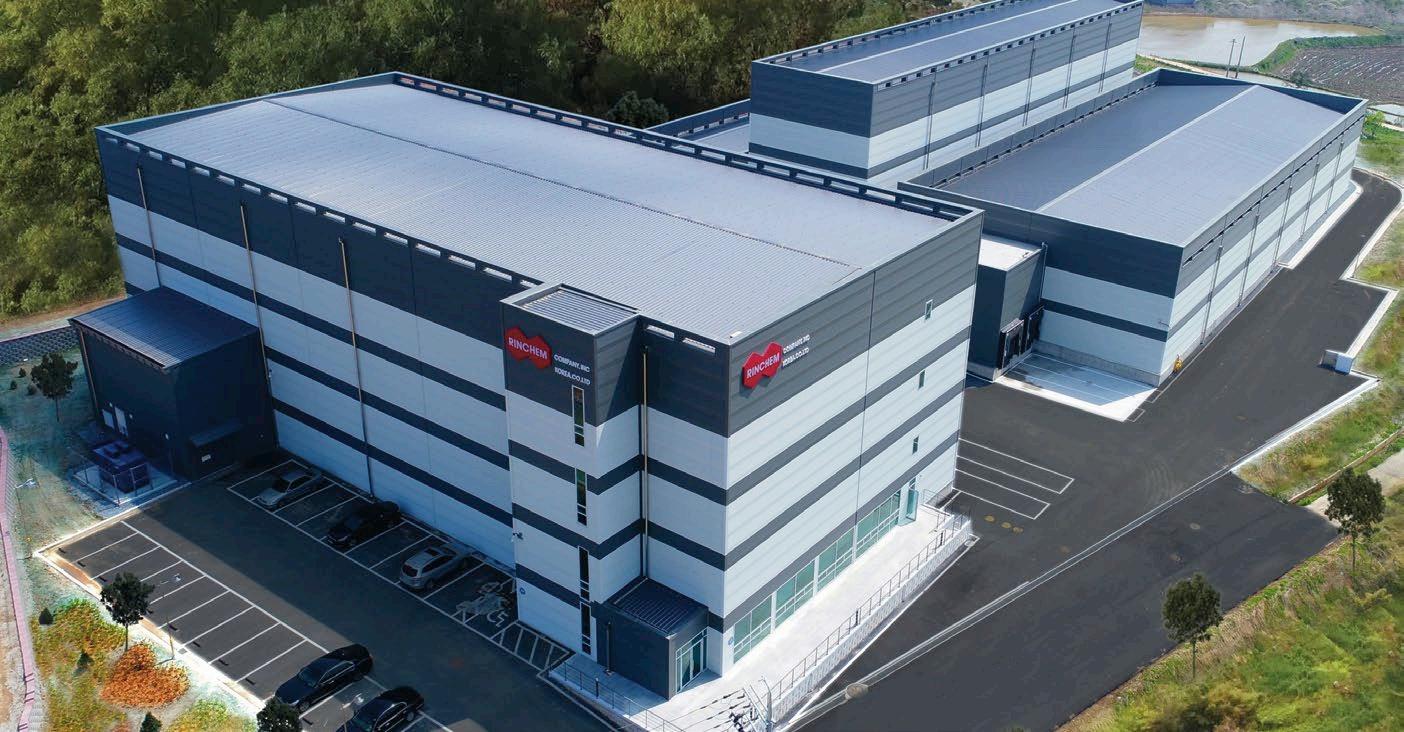

TSA
Tank Storage Associa on
The quarterly magazine from the Tank Storage Association
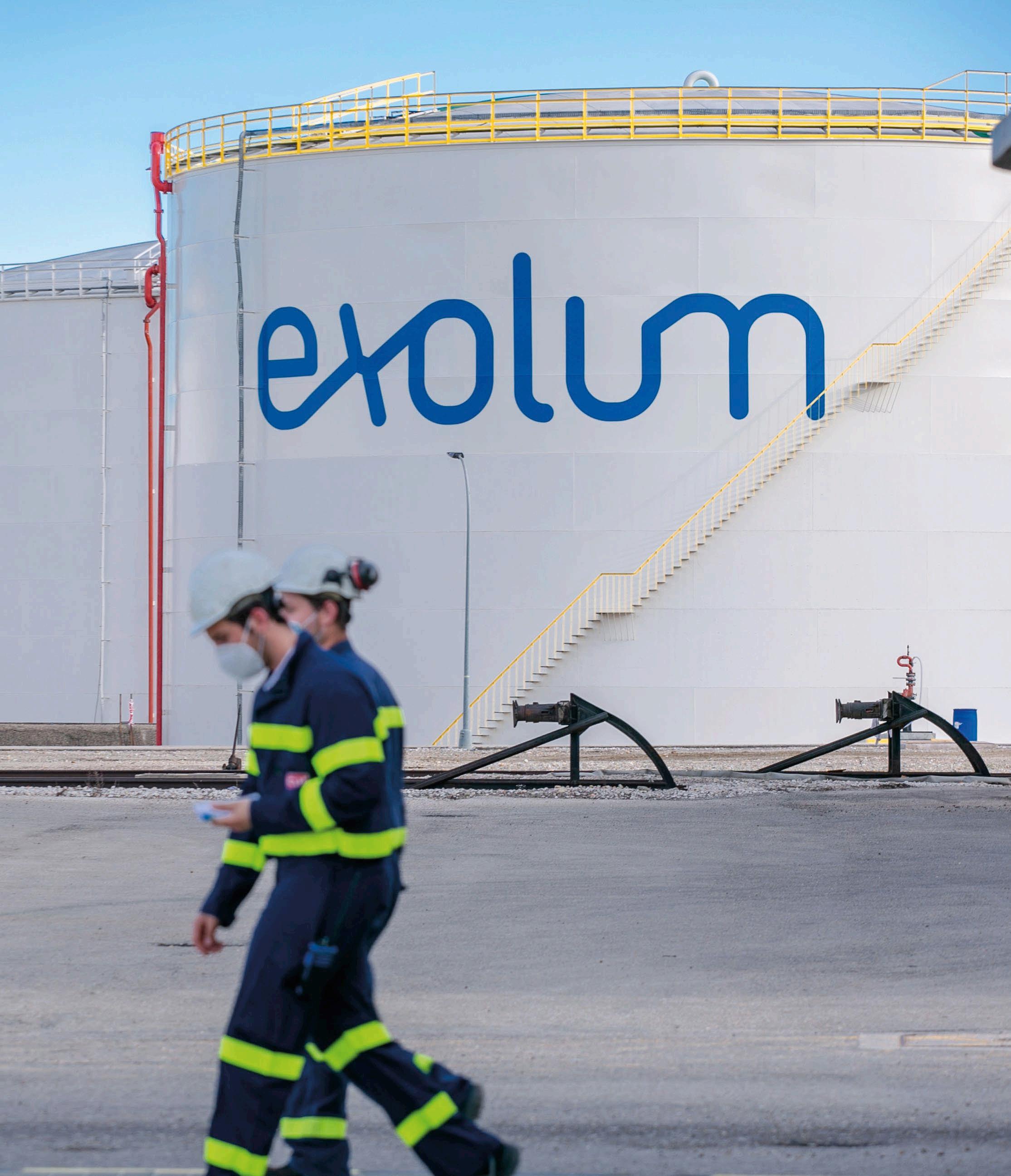
Tank storage provides an essential interface between sea, road, rail and pipeline logistics.
Page 10
Also in this issue, we look at AI technology, the future of DSEAR compliance and changes to red diesel regulations.
TSA
Tank Storage Associa on
Insight is published by the Tank Storage Association, the voice of the UK’s bulk liquid storage sector.
To contact the editorial team, please email info@tankstorage.org.uk
TSA Insight Team
Peter Davidson, Barrie Salmon, Nunzia Florio
CONNECT WITH US
@UK_TSA
Tank Storage Association
TSA
CONTACT
Tank Storage Association Devonshire Business Centre Works Road Letchworth Garden City Herts. SG6 1GJ United Kingdom
Telephone: 01462 488232 www.tankstorage.org.uk
TSA has used reasonable endevours to ensure that the information provided in this magazine is accurate and up to date. TSA disclaims all liability to the maximum extent permitted by law in relation to the magazine and does not give any warranties (including any statutory ones) in relation to its content. Any copying, redistribution or republication of the TSA magazine(s), or the content thereof, for commercial gain is strictly prohibited unless permission is sought in writing from TSA. Claims by advertisers within this magazine are not necessarily those endorsed by TSA. TSA acknowledges all trademarks and licensees.

Peter Davidson
Executive Director, TSA
Welcome to the summer edition of TSA Insight.
As a sector, we have a key role to play in the energy transition and are committed to supporting the UK government as they tackle climate change. This will undoubtedly require unprecedented innovation as well as partnership, significant investment and well-coordinated efforts by government, businesses, supply chains, consumers, and other stakeholders. In this issue of the magazine, we highlight the innovative strategies, efforts and forward-thinking plans of bulk liquid storage, a sector firmly focused on the future and the opportunities of tomorrow. We also explore compliance in a changing world and celebrate the successes of an ever-evolving industry, one which is looking ahead with optimism. I hope you enjoy this new edition of Insight and don’t forget to follow us on Twitter and LinkedIn to keep up to date with all our latest news.
Contents
05 In focus
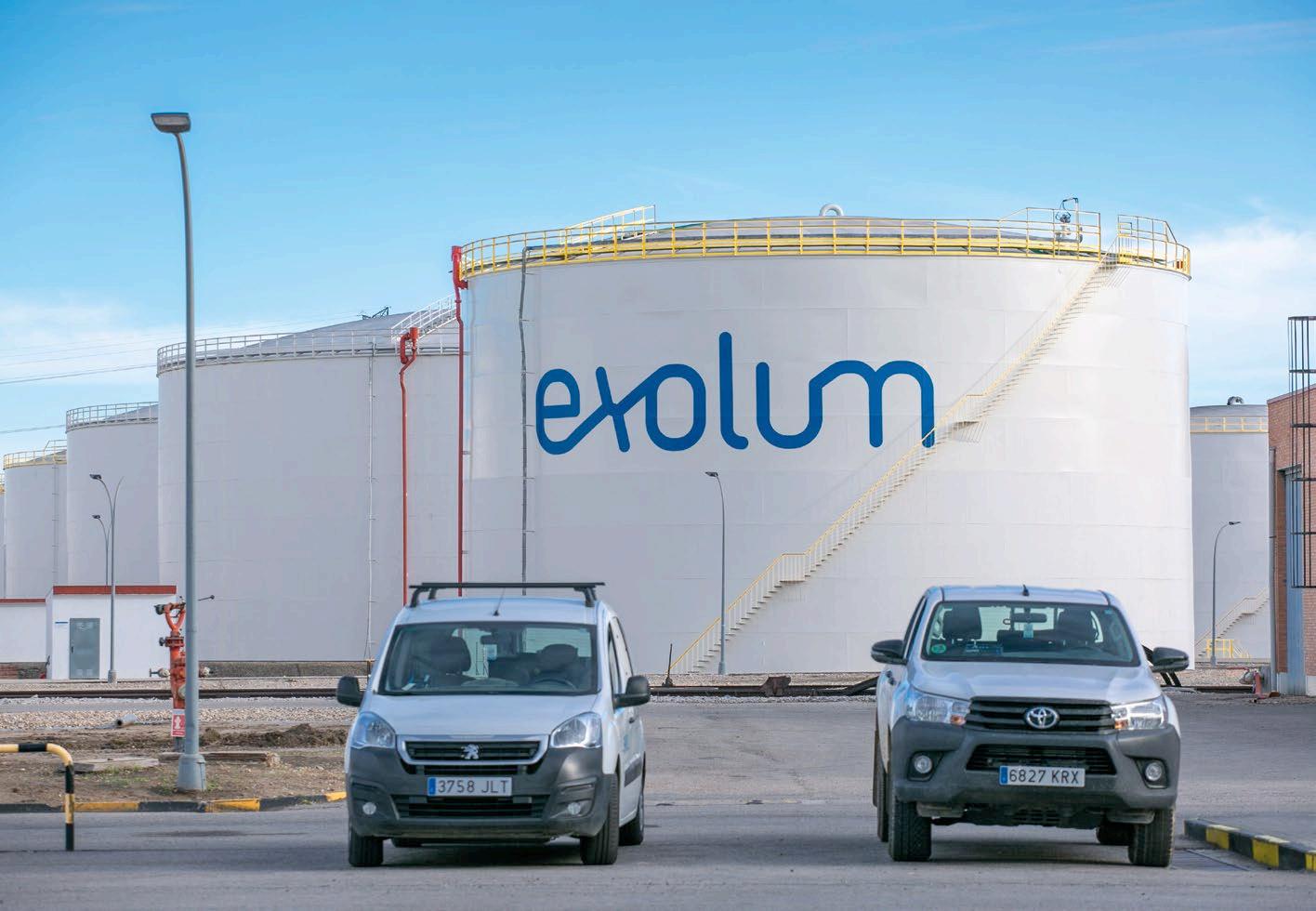
06 Using AI to see with Clarity
Nacho Casajus
CLH has recently evolved to Exolum in recognition of its international growth and to reflect its ambitious objectives for the future.
14 Looking to the future of DSEAR compliance
RAS Ltd tell Insight about the future of DSEAR compliance.
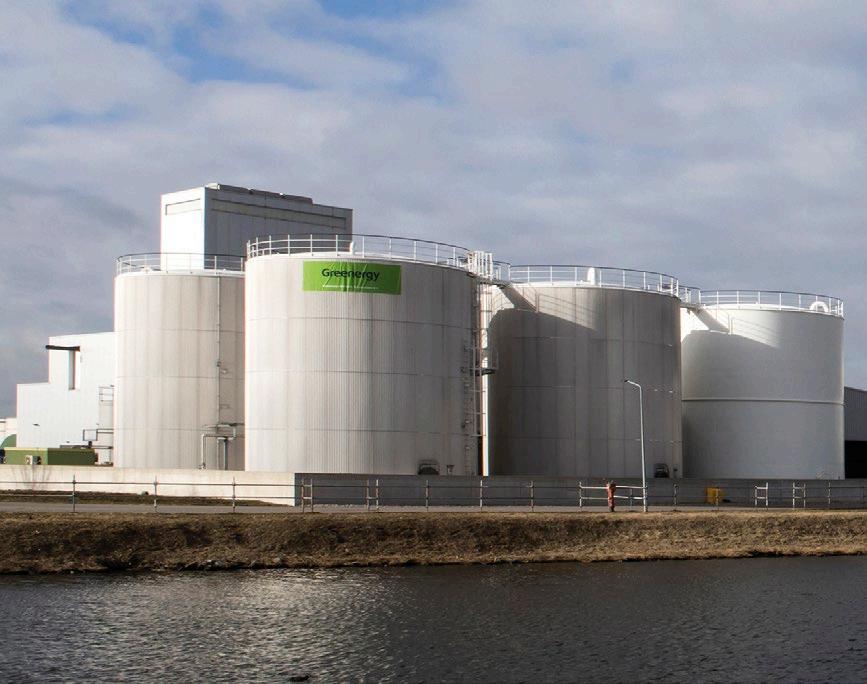
Page 10
16 Oikos Storage Limited is planning further investment and upgrades to its facility on Canvey Island
Oikos is planning further investment and upgrades as part of the proposed Oikos Marine South Side Development (OMSSD).
20 Changes to red diesel regulations – maintaining your critical assets
Adler and Allan explain why your approach to red diesel replenishment could shape your infrastructure’s sustainability, reliability, and performance for the long term.
24 UM Terminals reports strong demand following rebrand
UM Terminals, one of the UK’s leading bulk liquid storage companies, is reporting strong demand as it enters the second half of 2021. 28 Greenergy’s ongoing commitment to innovation
Greenergy has announced a new renewables project that uses proven technologies to transform waste tyres into advanced biofuels that can be blended into transport fuels.
30 In conversation with Ian Travers
Ian Travers, Director of Ian Travers Limited, talks to TSA’s Executive Director, Peter Davidson.
34 ISOlating the benefits of ISO 9001
Reynolds Training Services have achieved the prestigious ISO 9001:2015 Quality Management Systems certification.
Page 28
Online meetings and webinars
The COVID-19 pandemic has challenged our model of face-toface meetings. To adapt and respond to the current situation, all of the following meetings will take place online.
• 20 July 2021: TSA HR Committee • 26 August 2021: TSA Customs &
Excise Expert Committee • 7 September 2021: TSA Technical
Committee • 5 October 2021: TSA Council • 6 October 2021: TSA SHE
Committee
For more information on TSA’s meetings, write to info@tankstorage.org.uk The Health and Safety Executive has issued a safety alert � ‘Catastrophic failure of marine loading arm’. To know more, visit https://www.hse.gov.uk/ safetybulletins/marine-loadingarm-failure.htm
TSA’s Annual Review of the UK’s Bulk Liquid Storage Sector is available at www.tankstorage. org.uk/publications

2021 Tank Storage Conference & Exhibition
The TSA Conference & Exhibition is the UK’s leading event for the bulk liquid storage sector. The event provides one of the best opportunities for anyone interested in eff ective and safe bulk liquid storage operations to come together to share knowledge and network.
The conference programme will once again feature top keynote speakers from regulators and industry, as well as invited topic sessions and many opportunities for networking.
Registration is now open for delegates. Exhibitors can book a stand by visiting the TSA’s website at www. tankstorage.org.uk/conferenceexhibition. For those looking to elevate their presence further, sponsorships packages are also available.
The 2021 Conference & Exhibition is planned to be an in-person event, subject to any social distancing rules in place in September 2021 and remaining restrictions.
The TSA looks forward to welcoming members, exhibitors and delegates on 23 September 2021. To stay connected until then, please schedule a call with our conference organisers on 01462 488232 or or by writing to tsa@tankstorage.org.uk. For all the latest news, follow us on LinkedIn and Twitter.
For more information about the event and an agenda, visit https:// tankstorage.org.uk/conferenceexhibition/

USING AI TO SEE WITH CLARITY
n a recent digitalisation insight, Deloitte state that a data-driven approach can potentially reduce annual downtime by 70 percent and bring down unplanned downtime cost to 22 percent. These benefi ts are clearly convincing, however realising them can prove challenging, especially when new concepts require introducing. Terminologies and technologies often remain foreign to many parts of an organisation meaning gaining acceptance can be slow. As the Artifi cial Intelligence (AI) knowledge partner for TSA, HyBird wanted to take the opportunity to unravel some of the thinking and terminologies around this important facet of digitalisation and how it is currently being used to increase asset performance in the storage sector. One critical aspect of AI relates to the ability of a computer to see, known simply as Computer Vision (CV). The fi rst step of CV is to simply capture light and colour typically using highdefi nition cameras. The next step, object recognition, is also relatively straight forward for a human; we have a couple of million years of evolution. For a computer or machine, it is more complex. A machine cannot recognise objects as an instinct, it needs to be taught through a process called machine learning.
For example, training a machine to recognise the diff erence between the two tanks in Figure 1, requires multiple images of storage tanks to be processed by a model which is asked to make a prediction each time. The model then assesses the associated error of each prediction, identifying the
Inputs Model Predictions
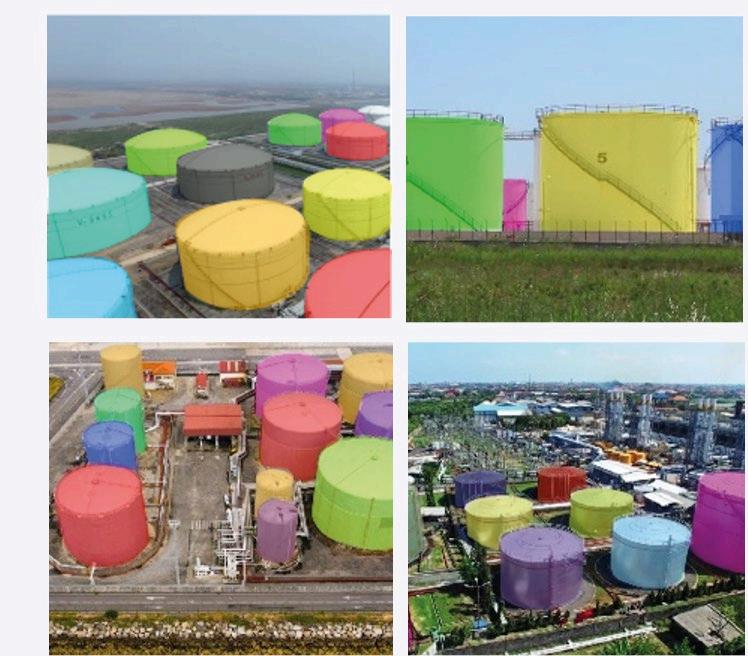

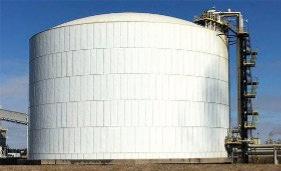

Figure 1.: Two very diff erent types of tank, easily discernible to human vision
cause and refi ning the process until and an acceptable level of accuracy is achieved.
“Without computer vision, even our smartest machines are blind” Fei Fei Lei, Director Stanford Artifi cial Intelligence Laboratory
Computer Vision in the storage sector
HyBird have developed a platform which applies AI and computer vision to improve many aspects of the business for the storage sector. Clarity is a new concept for managing everyday operations and maintenance which encompasses many asset workfl ows including visual inspections, engineering planning, workplan generation. AI and computer vision are interweaved in the Clarity platform at multiple points in the architecture from image quality inspection to auto recognition of equipment during the P&ID digitalisation process.
By scanning billions of 3D spatial data points and cross correlating with 2D image pixels, Clarity can sort and select optimal image quality. The engine, using AI is tasked with combining only the best images, reducing noisy image data and selecting only the best quality images from survey grade laser scans (LiDAR) and visual imagery and videography
3DRM of Greenergy’s Plymouth terminal to produce an ultra high-fi delity 3D reality model or 3DRM, an example of which is shown below.
Although the generation of a 3DRM is a highly complex task, it is only part of the Clarity platform. The other key components include further use of AI and the integration of workfl ows within the platform itself.
The platform aff ords the ability to perform inspections consistently across multiple site locations. Our AI can be trained to perform change detection between inspections, by monitoring changes in surface features and through dedicated algorithms it is able to predict corrosion development.
The platform has proven to be the natural home for the multitude of IoT sensors which can vastly improve visibility of critical process and asset integrity parameters. For example, Clarity has been customised to incorporate vibration sensor data from sensors on rotating equipment.


Our Smart P&ID capability digitally transforms plant knowledge management
The high precision of the 3DRM, which has an accuracy of 1.2 mm, has been used to analyse the structure of storage tanks by replacing tilt tests with billion-point 3D tank analysis in less than 1/10th of the time
Knowledge management is also improved across a site. Clarity can generate Smart-P&IDs using automated component mapping, ensuring your team has a direct link between your existing P&IDs and your plant’s reality. Locating the actual piece of equipment on the site 3DRM is as simple as a click on the PDF of your smart P&ID. Clarity also integrates seamlessly into EAM systems such as SAP enabling asset registers to be readily exchanged and work orders executed and managed.
Clarity has proven to be a great fi t with our clients’ needs. The feedback has been very rewarding.
“Greenergy began to work with HyBird in late 2020 to
explore new technology and explore the options within AI technology. Within the 8 months we have been working with HyBird, we have managed to realise immense benefi ts from the Clarity platform. It is now a cornerstone of the future of inspection, maintenance, and operations. This will allow us to conduct less manpower intensive inspections and reduce downtime of assets, during inspections”
Sean Sexton, Global Head of Technical & Terminals, Greenergy
What are the benefi ts?
The benefi ts can be classifi ed under fi ve broad themes:
Improved Business Continuity • Clients have increased asset availability & reliability • By integrating workfl ows, they have streamlined work planning & execution (with a reduced workforce)
Increased Knowledge Management • By capturing specific plant knowledge with respect to visuals (and others) through built-in ‘historian’ capability • Enable historical inspections to be readily accessed
Overall Cost Reduction • Reduce inspection, maintenance, engineering and contractor costs • Minimise scaffolding and access costs
Improved Remote Cooperation • By allowing contractors to access
Clarity our clients have Increased productivity virtually with 3rd parties • During Covid, they have minimised disruptions with fewer on-site personnel Increased Digital Transformation • Clarity has brought the practically of CV & AI to the forefront such that implementation is immediately beneficial
Summary
Clarity is a valuable platform which is proven to improve many aspects of operation and maintenance in the storage sector. The model is best suited to companies who have programs to:
• Increasingly work collaboratively yet remotely • Increase operational efficiency • Optimise the time of their staff • Improve plant knowledge management As we continue to innovate, additional exciting features, such as automated inspection capabilities using robots a mobile app extension using augmented reality (AR) and our own solution to the internal inspection of vessels will further increase the value the platform brings.
As a knowledge partner for TSA members, we would be happy to answer any AI, digitalisation and computer visions queries that our fellow members may have and our vibrant team can be contacted on the details below.
W - www.hybirdtech.com E - business@hybirdtech.com T - +44 (0) 207 267 7197 M - +44 (0) 787 217 3201

EXOLUM’S EVOLUTION AND AMBITIONS FOR THE FUTURE: IN CONVERSATION WITH NACHO CASAJÚS
Nacho Casajús NWE Lead Exolum
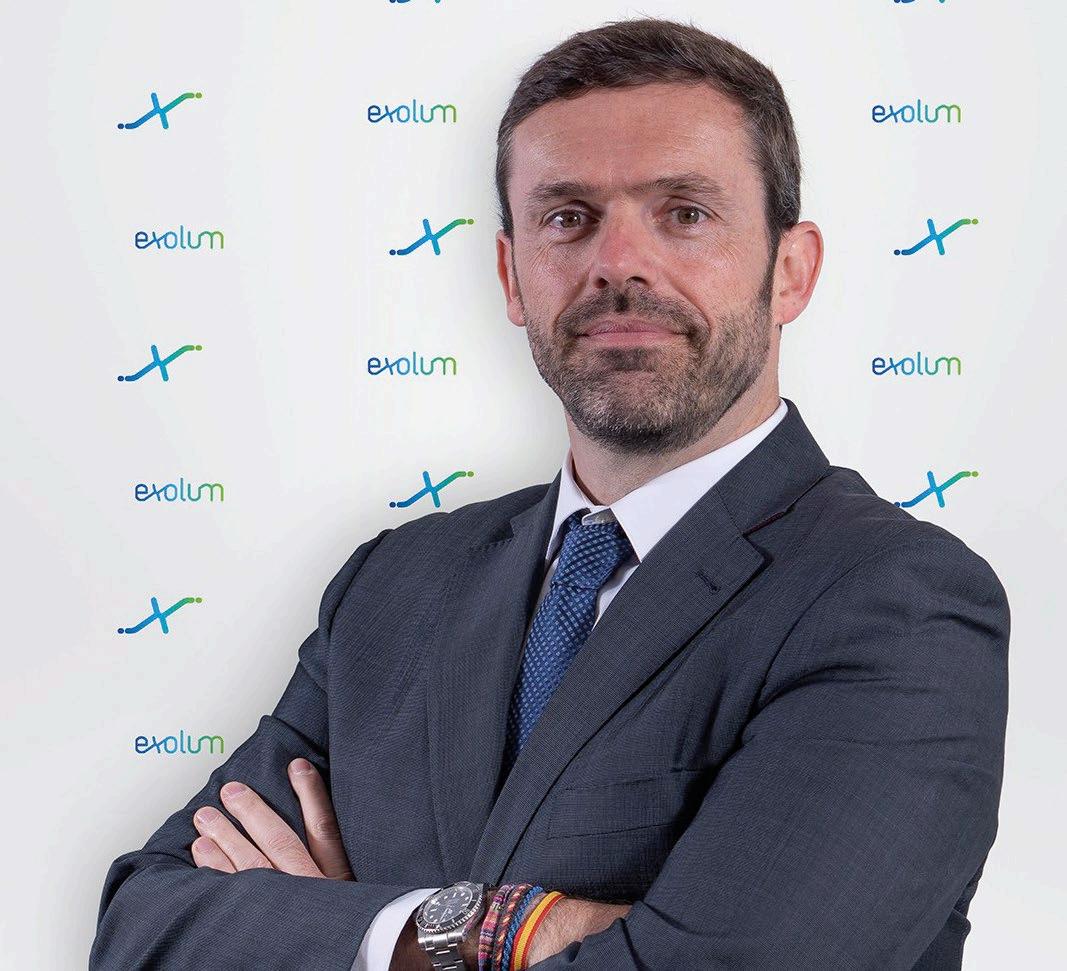
C
LH has recently evolved to Exolum in recognition of its international growth and to refl ect its ambitious objectives for the future. It has also won an award at the second edition of the UK-Spain Business Awards in March this year. Nacho Casajús, NWE Lead, explores Exolum’s evolution and ambitions in light of the fundamental role of the tank storage sector and associated logistics in enabling the energy transition.
What are Exolum’s ambitions and objectives for the future?
Compañía Logística de Hidrocarburos) is a company with a long history and was originally founded in 1927. In recent years, as part of an important evolution and diversifi cation process, across markets, services and products, the company purchased from the UK government the Government Pipelines and Storage System (GPSS) network - a system of pipelines and storage terminals, managed up to that time by the Ministry of Defence, providing aviation fuel logistics to both RAF stations and civil aviation. This was followed in 2020 by the purchase of 11 terminals in the UK from Inter Terminals, also a company with a long history, having been founded in 1929. This year, the CLH Group began operating under the brand name Exolum as part of this diversifi cation process and to refl ect the company’s ambitions for the future, particularly in the context of the energy transition. Indeed, this change represents an explicit commitment by the company to both the energy transition and to driving solutions for the future in an effi cient, safe and sustainable way, which is at the heart of our strategy. Exolum’s evolution means that, while continuing to perform our traditional business of hydrocarbon transport and storage, we can also progress our capabilities, combine assets, experience and know-how to enable the transition.
As we look back to our history, we are proud of the way in which we have been able to succeed and grow over the past 90 years. Looking ahead, Exolum looks forward to another 100 years of success. This will mean adapting infrastructure to be suitable for the new opportunities of the future and creating the solutions that will drive success going forward. Coupled with the need for technology neutral approach that incentivises a whole range of low-carbon technologies, this evolution will enable us to play our part in ensuring that society has access to the products that will be needed. Exolum has also been recognised by the IEA as one of the most effi cient logistic companies

in the world, which undoubtedly refl ects our focus and ambition for the future. In seizing future opportunities, technology will also play an important role. Throughout our history, we have implemented change through technology, from remote control for pipelines in the 1950s, to data mining and utilisation for our services producing valuable information for our customers. And we want to continue to be recognised as leaders through technology and innovation.
What role will evolving technologies - such as automation, IoT and AI - play in supporting these ambitions?
At Exolum, technology has always been at the core of what we do. And we have been pioneers in the automation of our activities which has allowed us to have highly effi cient processes that have been key to our ability to adapt to changes and meet the needs of our customers. IoT and AI undoubtedly play an important role in supporting this ambition. Though, it is important to note that, as well as leaders in innovation, we want to be regarded as leaders in safety, effi ciency, responsibility and sustainability by our employees and customers alike. For a few years now, we have utilised a ‘Digital HUB’ programme for the coordination of digital initiatives across the business. These initiatives include the use of a new pipeline monitoring system using AI and satellite technology that increases the safety and reliability of these infrastructures and optimises data analysis. This has enabled us to drive improvement not only in safety and effi ciency, but also in the customer experience, thus providing added value to customers. Our digital transformation programme also covers the implementation of predictive maintenance in the management of the logistics network; while AI is being used to improve forecasts of oil product outfl ows from our facilities. In addition to these innovations, Exolum is developing a new product quality management system and has introduced technological solutions to reduce the risks associated with in-tank sampling operations.
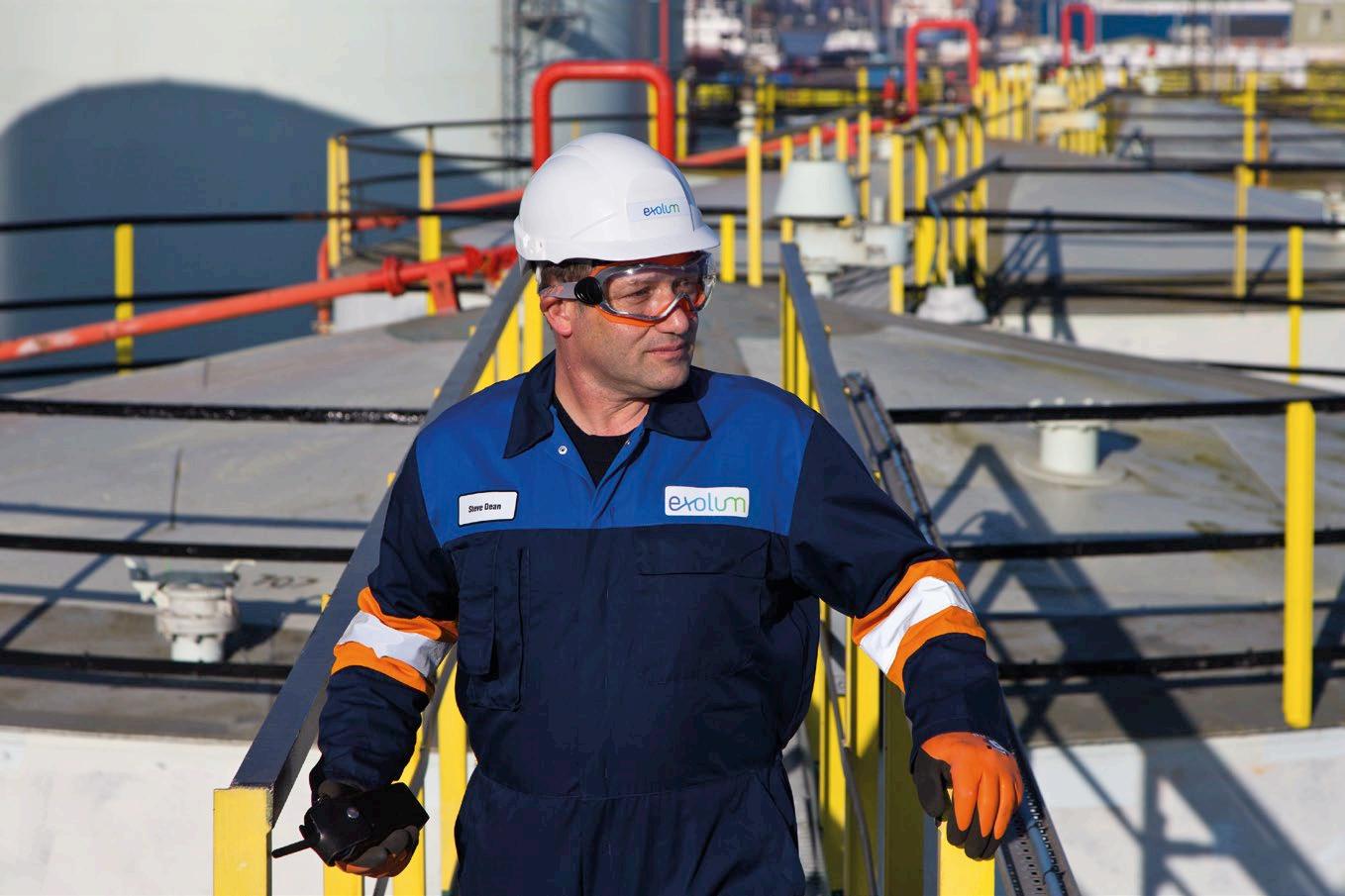
What are the opportunities and challenges that the post-COVID 19 period presents for the industry?
The sector has undoubtedly felt the impact of the coronavirus (COVID-19) pandemic, particularly in light of supply demand balances and market fl uctuations. During this time, the industry has shown great resolve and resilience. The pandemic has also forced businesses to work diff erently, and this has brought both opportunities and challenges. Over the past year, our experienced teams have adapted quickly and swiftly to the restrictions imposed by Covid-19, maintaining our services and responding to what customers expect of us, particularly in terms of a quality service and safety. Needless to say, our commitment to service and safety will continue in a post-Covid-19 environment.
Yet, after what has been a challenging year for markets across the globe, I am optimistic that our industry will see increased levels of activity as we emerge from this unprecedented public health crisis.
We are proud of the way in which we have been able to succeed and grow over the past 90 years. Looking ahead, Exolum looks forward to another 100 years of success.

Looking ahead, there are also big opportunities in the context of the energy transition and decarbonisation where, as a sector, we are uniquely positioned to act by ensuring that demand for products is effi ciently met and by adapting infrastructure to meet future societal needs. For the bulk liquid storage industry this will mean being fl exible and agile in responding to changes, while remaining safe, sustainable and profi table (and keeping that licence to operate!). At Exolum, we have already recognised this potential and are developing business models related to the possibilities of production, distribution and use of fuels and energy solutions using waste or sustainable raw materials as feedstock. We also have diversifi cation projects in place associated with the energy transition, both in terms of sustainable energy alternatives, such as hydrogen and eco-fuels, and the circular economy. And we have established an entrepreneurship division dedicated to promoting new business opportunities that are committed to the sustainability of the planet. We want to be a player in the future, and we are part of the solution!
What kind of policy and industry initiatives will be required to ensure that opportunities can be seized?
A stable and predictable regulatory framework, along with a technology neutral approach that incentivises a whole range of low-carbon
technologies, will be key to enable the sector play its part. Indeed, the energy transition and decarbonisation will encompass a number of solutions, such as e-fuels and sustainable biofuels. In this light, collaboration and dialogue with key decision makers at both national and local level will ensure that we can manage the changes ahead safely and that we don’t lose future opportunities. Some collaboration between the public and private particularly in relation to infant technology might also be needed. Players in the sector will need to be agile and adaptable to change – we cannot stand still!
In this context, it is also important to note that we need the next generation of professionals to be interested and attracted to this vibrant and dynamic industry. Our sector is now evolving and changing, with new and exciting opportunities opening up and more complex services being provided. Against this background, it is important that we share our purpose, innovation capabilities and progressive vision for the future to attract the next generation of talent.
Nacho Casajús – NWE Lead Exolum
Nacho leads the North-West Europe Region of the company after a long career at CLH. He joined the company in September 2001 and has held diff erent roles in the Operations teams. He has looked after diff erent terminals in the south of Spain (2001-2006), as a Terminal manager in Torrejón (2006-2007) and as manager of the Operations Control department (2007-2011). In 2011 he became General Manager in Vopak Terquimsa, the joint venture Exolum has with Royal Vopak in Tarragona and Barcelona. In 2016 he rejoined Exolum as commercial director and CEO for the UK, and since the acquisition of Interterminals he serves as NorthWest Europe Region Lead, overseeing after the UK, Ireland, Germany and the Netherlands. He earned his Master of Science in mining engineering at the Higher Technical School for Mining Engineering (ETSIM) of the Polytechnic University of Madrid and a Master in Energy Business Administration from Instituto Superior de la Energía (ISE), together with a Management Development Program (PDD) from IESE and has extensive experience in operational, executive, strategic and corporate management garnered while holding management positions in both Spain and the UK. Mr. Casajús has successfully transformed diff erent business units, defi ning and implementing long term strategies with a clear focus on sustainability and a strong orientation to results while fostering the growth of the internal teams.
For more information, visit www. exolum.com

LOOKING TO THE FUTURE OF DSEAR COMPLIANCE
Jenny Hill and Carolyn Nicholls tell Insight about the future of DSEAR compliance. T
he Dangerous Substances and E x p l o s i ve Atmospheres Regulations (DSEAR) have been around for some time, and those under the scope of them will be well aware of their requirements; demonstrating how the risks associated with fl ammable atmospheres are identifi ed and managed. We mustn’t get complacent, though. Industry is changing as we begin to move towards the Net Zero goal, regulation is being revisited as we fi nd our feet with Brexit, and more generally, our knowledge and understanding of fl ammable atmospheres is increasing as more research is undertaken. It is important that operators keep up to date on what it means to be compliant in an ever-changing world.
Hazard Identifi cation (HAZID) is the starting point of all risk management activity, and DSEAR compliance is no diff erent. Thorough HAZID will

It is important that operators keep up to date on what it means to be compliant in an ever-changing world.
RISK & HAZARD MANAGEMENT
make sure that a site’s Hazardous Area Classifi cation is comprehensive and that it covers the less obvious risks, such as hydrogen leaks from faulty battery rechargers. It will also capture releases that fall outside of the guidance; those from larger hole sizes or gas generation by accidental material mixing. HAZID in DSEAR compliance is something to bear in mind as we set off on the path to Net Zero. There are signifi cant changes on the horizon as hydrogen is to play a key role in meeting our energy targets, and with that comes new challenges in identifying and managing potential fl ammable and explosive atmospheres. Operators will have to consider hazards that they had not considered before, so identifying any knowledge gaps will be essential. Now is the time to be prepared, to look out for emerging research and guidance in this area from relevant industry bodies and to become familiar with the challenges these changes will bring to industry.
We know that DSEAR goes beyond Hazardous Area Classifi cation and onto demonstrating that we have the measures in place to manage our risks. The terms DSEAR and ATEX have previously gone hand in hand as the legal frameworks that require us to make that demonstration. Following Brexit, ATEX is no longer recognised in UK law, but it is important to remember that the requirements of the ATEX Workplace Directive (99/92/EC) continue to be implemented in the UK by the DSEAR Regulations. The obligations of the operator, to provide a demonstration that the risks associated with explosive atmospheres are managed, remain unaff ected but the removal of ATEX from UK law does present a good opportunity to clear up some confusion over Explosion Protection Documents (EPDs). There has sometimes been a misconception that operators require an EPD, as they are a requirement of the ATEX Workplace Directive. However, the DSEAR Regulations do not specifi cally require an EPD. As long as the organisation can demonstrate that the requirements of the Regulations are met, then they are compliant. The EPD could be felt to be a ‘one size fi ts all’ approach, but UK law gives us more freedom. That does not mean that a standalone document is not a good idea; having all information in one place (for example in a ‘DSEAR Compliance Report’) is an easier way to demonstrate compliance, particularly on sites not under the scope of other associated regulations (i.e. COMAH). Without the requirement for an EPD, however, COMAH Operators in particular are free from having separate documents with duplicated information; they have the opportunity to provide their demonstration for both DSEAR and COMAH within their Safety Report. While the requirements of the ATEX Workplace Directive continue to be implemented in the UK by the DSEAR Regulations, equipment certifi cation in line with the ATEX Equipment Directive (94/9/EC) is now no longer recognised. The requirements have been transposed to UK Regulation, meaning that for manufacturers, conformity assessments for equipment must now be carried out by a UK Approved Body. UK type certifi cates are to be used in place of ATEX Certifi cation and CE labels are to be replaced by UKCA labels (although in most cases, manufacturers are permitted to continue to use CE markings until a transition period ends on 1st January 2022). For the operator, this makes little diff erence in the short term, as the equipment requirements for the EU and UK equipment certifi cation remain the same.
Operators will always have the responsibility to keep their employees safe by identifying and managing their risks. Though the fundamentals of regulation will remain the same, changes in the industrial and political landscapes mean that operators need to adapt and identify how they can continue to fulfi l their responsibilities, and DSEAR compliance is no diff erent.
O
ikos Storage Limited, a nationally signifi cant bulk liquid and fuel import and storage facility that has been operating since 1936 is planning further investment and upgrades to its facility on Canvey Island, as part of the proposed Oikos Marine South Side Development (OMSSD).
The OMSSD project forms part of an ongoing investment programme to upgrade and enhance Oikos’ operations, to ensure that the company can continue to set industryleading safety and environmental standards. It will also enable Oikos to future-proof, and play a vital role in the transition to sustainable biofuels, that will be important as the UK prepares to become net-zero in the coming decades.

It is important to ensure that the best use is made of the existing critical piece of national infrastructure that is the Oikos facility. The needsbased case for this project emerges out of a consideration of a number of factors including the signifi cance of the Oikos facility; the signifi cance of the trade handled by Oikos; the changing nature of that trade (including in respect of the increasing development of sustainable liquid fuels); the signifi cance of a fl exible, resilient and competitive fuel provision and distribution system; and the recognised signifi cance of the need for the type of infrastructure provided by the Oikos Facility.
The nation is increasingly reliant on fuel which is imported into the UK by deep draft sea-going tankers to import terminals like the Oikos Facility. The existing facility plays a critical part in maintaining the UK’s fuel supply system that has capacity in the right location at a key entry point into the largest fuel market within North-West Europe.
The OMSSD project consists of the installation of new import and export infrastructure, including new marine loading arms and pipelines on the
existing operational jetties and the construction of around 300,000m3 storage capacity on previously occupied brown fi eld land across the southern part of the facility. Other associated works such as a new workshop, additional road tanker loading facilities, additional on-site parking, an extension to the existing offi ce and off -site ecological mitigation works also form part of the OMSSD.
The project is expected to take approximately 24 months to construct. If consent is granted in late 2022 for the project, Oikos would anticipate starting construction in early 2023 and would then expect the OMSSD to be operational between Q4 2024 and Q1 2025.
The Oikos facility has a number of signifi cant assets and benefi ts which are collectively unique. On top of its strategic Thames side location, the facility has existing connections to two nationally signifi cant fuel distribution pipeline networks and modern infrastructure in place to accommodate further product handling infrastructure. The facility has two operational jetties, which can accommodate vessels of up to 55,000 and 120,000 tonnes deadweight respectively. Furthermore, the site includes areas of previously developed but currently vacant land within the operational boundary of the site.
The existing facility plays a critical part in maintaining the UK’s fuel supply system that has capacity in the right location at a key entry point into the largest fuel market within North-West Europe.

For more information, visit www.oikos.co.uk
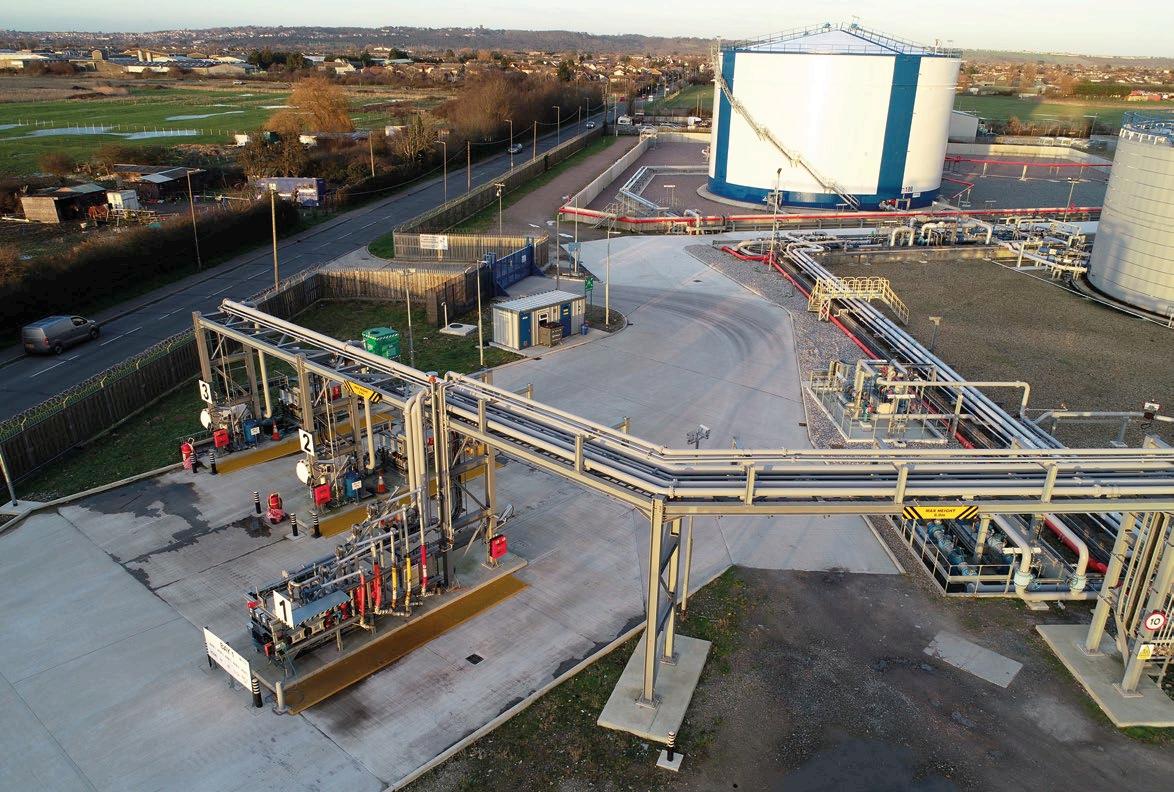
The Oikos Marine South Side Development will enable futureproofi ng of the site by investing in new facilities and infrastructure that will ensure Canvey Island is a leading hub for green and sustainable fuels in the years to come.
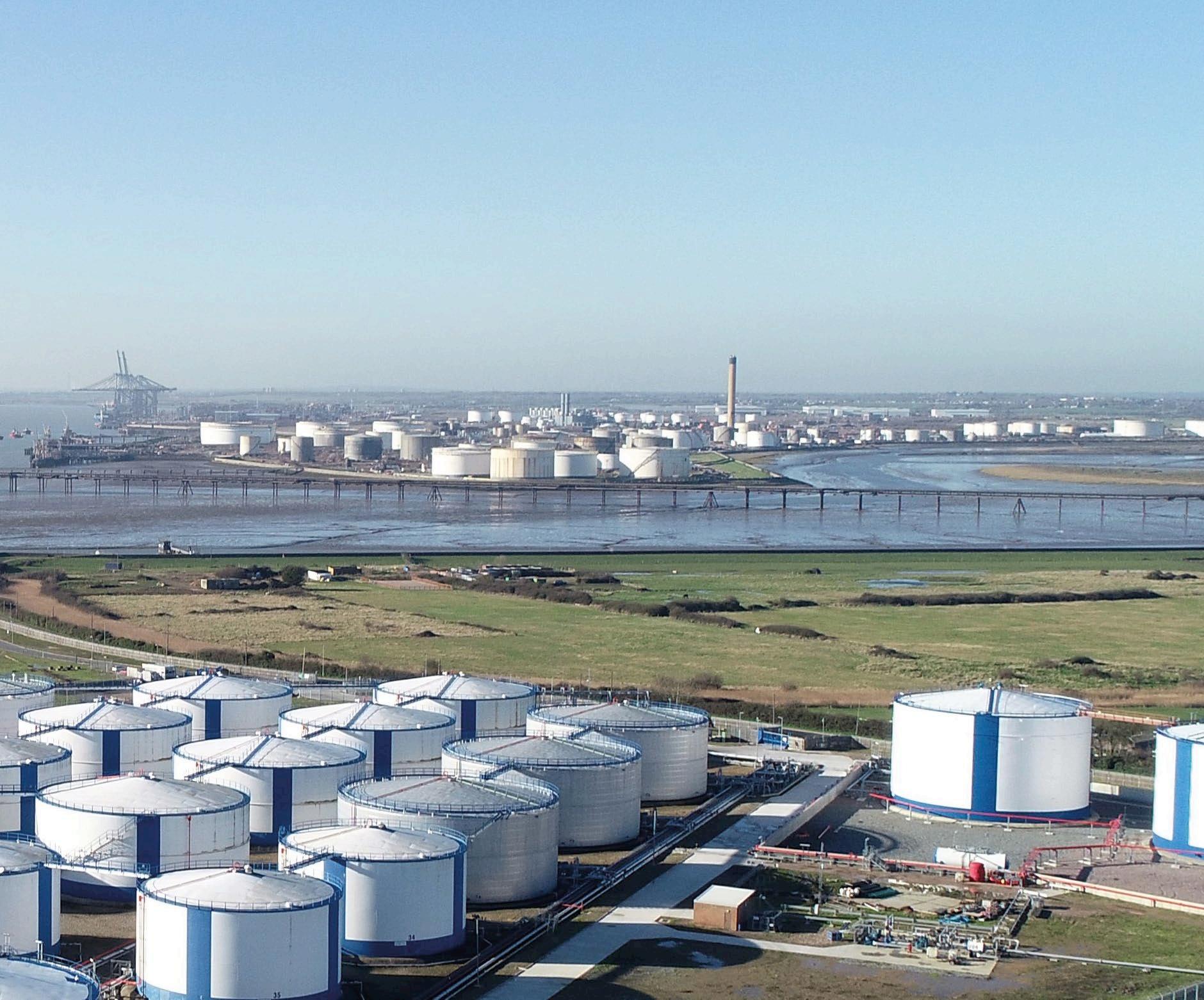
The products Oikos handle are signifi cant and the changing nature of the trade means that facilities like Oikos will continue to be important for UK energy supplies going forward. The UK needs to continue to have a fl exible, resilient, competitive and safe fuel supply system that provides capacity where it is required. With Government targets in mind, the OMSSD project is part of Oikos’ plan to future proof the facility so that it can adapt to the changes in fuel markets and facilitate the safe storage and distribution of alternative liquid fuels when they become more widely available and used.
This is an investment where Oikos is seeking to ensure resilient fuel supplies for the UK now and also to adapt to support the energy transition to renewable liquid fuels of the future.
Resilience in our critical national infrastructure, in its widest sense, has to be the focus of the UK’s next economic chapter, not least after Covid-19. All too often, the focus is often on downstream and upstream fuel resilience and innovation, but the storage sector has to be a part of the solution and not overlooked. Oikos with its strategic access to the River Thames, is taking this challenge on through signifi cant infrastructure investment at its site that supplies road and aviation (including to Heathrow, Gatwick, Stansted and Luton) fuels across South East England, one of the world’s leading fuel hubs.
Oikos are proud to be keeping Canvey Island at the heart of the country’s fuel and transport needs as it has done for the last 80 years. The Oikos Marine South Side Development will enable future-proofi ng of the site by investing in new facilities and infrastructure that will ensure Canvey Island is a leading hub for green and sustainable fuels in the years to come.
The proposals have safety by design at their heart and have been rigorously reviewed at every stage. As a facility with an established place on Canvey Island, Oikos plans to continue to work with local communities and stakeholders to ensure that the development of the best possible proposals.
It is encouraging to see the sector increasing its resilience at this point in the economic cycle. Such eff orts do need the Government to continue to see the fuel storage sector as critical national infrastructure and to provide the policy and investment certainty over the long-term to ensure the sector is seeing the innovation needed.
Oikos Storage Limited operates a nationally signifi cant marine fed oil, fuel and bulk liquid import and storage facility, located on Canvey Island in Essex. For more information, visit https://www.oikos.co.uk/

Oikos are proud to be keeping Canvey Island at the heart of the country’s fuel and transport needs as it has done for the last 80 years.
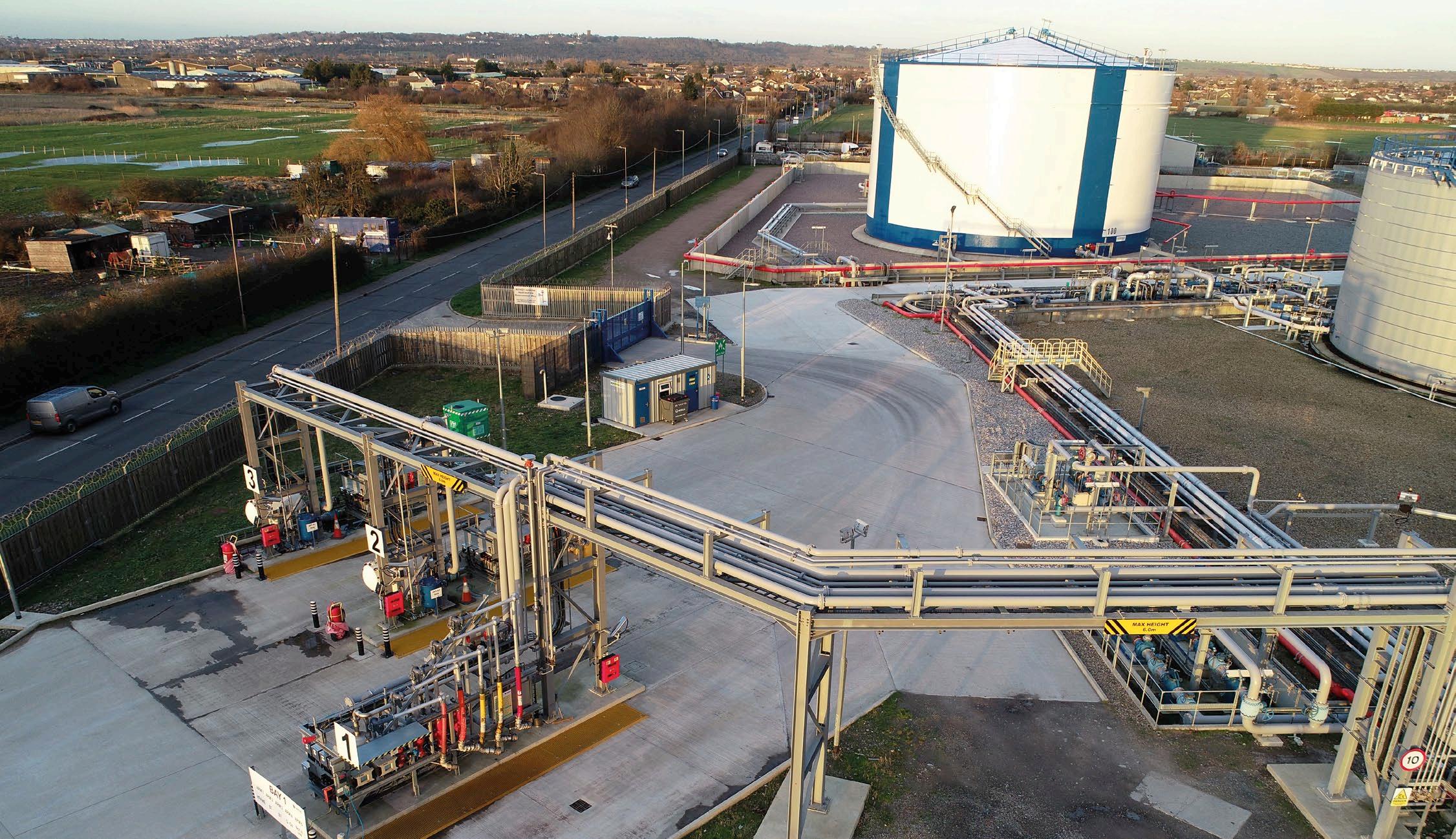
CHANGES TO RED DIESEL REGULATIONS – MAINTAINING YOUR CRITICAL ASSETS
F
rom April 2022, many sectors will lose their red diesel fuel tax entitlement, relinquishing the 80% per litre saving it currently delivers. Announced as part of the 2020 budget, the reforms drive forward ambitious UK climate change commitments to promote eco-friendly fuels, improve air quality, and achieve net zero carbon emissions by 2050. While the updated legislation is a vital step towards corporate environmental accountability, greener business practices come at a signifi cantly higher price. Companies across the bulk liquid storage industry must now make plans to replace existing plant and machinery reserves with alternative fuel options – such as white diesel, biodiesel or Hydrotreated Vegetable Oil (HVO), a 100% renewable ‘drop in’ diesel substitute – while mitigating risks of downtime and drops in customer service. However, with the correct
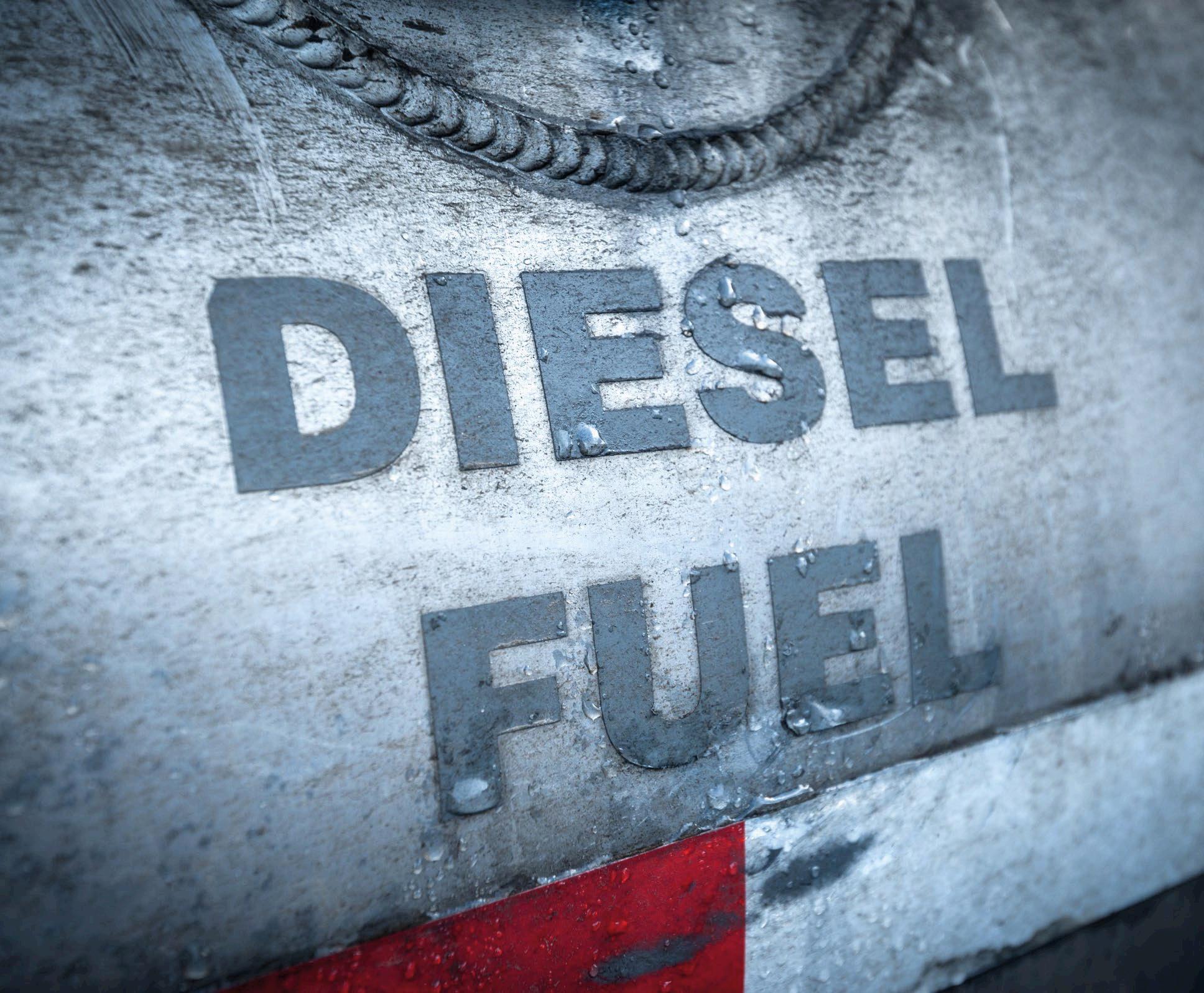

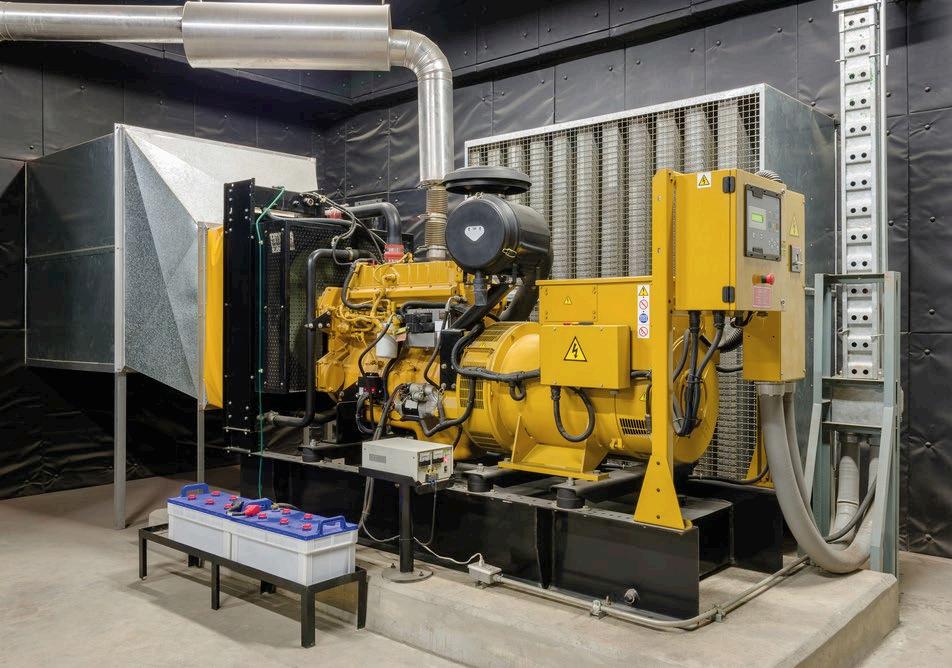
strategy and support, the immediate challenges of the red diesel transfer could lead to positive, cost-eff ective change across your entire operation.
A money-saving shift in mindset
Otherwise known as gas oil, red diesel has long provided economical power for fl eet vehicles, heavy duty equipment, back-up generators, and more. The jump to pricier, paraffi nfree fuels – from 11.14 pence per litre to 57.95 ppl for white diesel – will present operations managers with the tricky task of reconciling increased environmental responsibility with already stretched BAU budgets.
So how can bulk liquid storage operators strike the right balance? The answer is to view the red diesel reforms not as a one-off fuel swap, but as a unique opportunity to future-proof assets and rethink your organisation’s overall effi ciency, sustainability and green credentials. By taking a big picture view, companies can safeguard operations going forward and get a running start on the UK’s increasingly ambitious targets to reduce global warming. With the Environment Bill expected to come into force later this year, stricter policies will continue to be enshrined in law – and the countdown to compliance has already begun.
Enlisting the support of an experienced environmental risk consultant will allow you to shape your ideal solution, investment, and timeline – and avoid productivity breaks, weighty capex commitments, and penalties under more demanding government directives.
Start-to-fi nish compliance support
The replacement of red diesel involves a specialised sequence of tank cleaning, line fl ushing, and the uplift of current stores to make way for onward fuel. The success of the procedure – and its make-or-break impact on your end-users – depends on a detailed understanding of your estate, systems, and risk profi le.
As a fi rst step, an environmental professional will undertake a practical audit of assets to gauge their condition, potential ecological hazards, and the recommended plan for fuel uplift and fulfi lment. Key actions are likely to include full tank inspections to assess structural integrity, comprehensive cleaning and removal of red diesel residue to prevent fi nes, and responsible disposal in line with current compliance guidance.
Following open dialogue and mutual agreement of your ideal methodology, skilled onsite technicians – trained in the use of all fuel transfer pumps, the handling of hazardous materials, and spill response protocols – will carry out the end-to-end replenishment process with minimal downtime and disruption. Once tanks are degassed and clear of residue, legacy fuel will be removed and disposed of in line with current compliance guidelines.
Tailored follow-up consultation will focus on top line business goals and proactive measures to safeguard the ongoing health of your assets and equipment, from possible tank relining to upgraded fuel maintenance and management programmes.
A measured response with measurable results
Following a government consultation ending in October 2020, the fi ner details of red diesel reforms are yet to be revealed, but prudent operators will take immediate – yet considered – action. By initiating the planning process now, and aligning with a commercially minded environmental specialist, it is possible to intelligently spread investment and alleviate the fi nancial burden of building a more sustainable business.
A professional consultant will support you in pinpointing and prioritising your most critical environmental risks, while – crucially – setting timescales for less urgent requirements, allowing you to make meaningful changes at a manageable pace.
In the HM Treasury consultation document presenting amended tax treatments of red diesel and other rebated fuels, the government shares its vision to ‘provide businesses with a much stronger incentive to improve the energy effi ciency of their vehicles and machinery, look for more environmentally friendly alternatives, or just use less fuel’.
It also describes the updates as ‘a signal to bulk liquid storage providers to design and sell new alternatives, thereby creating a more competitive market and consequently bringing down the price of these alternatives’. So while bulk liquid storage operators wait for clean fuel costs to fall, they should begin transforming operations one compliant stride at a time.
Readying your assets for the move to fossil-free fuels and developing a deeper understanding of your environmental risks and opportunities are sensible places to start. With a trusted partner by your side, you can intelligently analyse assets, unlock effi ciencies, and create a fuel maintenance programme that is fi t for a sustainable future.
A qualifi ed environmental professional will help you tackle the pressing duty of red diesel replacement, make the switch with minimum spend, and navigate your most productive path to lasting compliance.
UM Terminals appoints new Commercial Director
One of the UK’s leading bulk liquid storage specialists has appointed an experienced commercial director.
Vic Brodrick took up his new role on May 1 having previously worked as a consultant with responsibility for sales strategy.
UM Terminals recently put in place a new strategic growth plan to build on the substantial investment the business has made into upgrading its facilities and operations. UM Terminals operates out of 8 terminals, strategically located across the UK, handling over 40 diff erent products. It currently has a capacity of over 300,000 cubic metres of bulk liquid storage, but the plan is to grow this to over 400,000 cubic metres. Product solutions include vegetable oils, industrial, food and feed, chemical, fertiliser, fuels, biofuels and base oils.
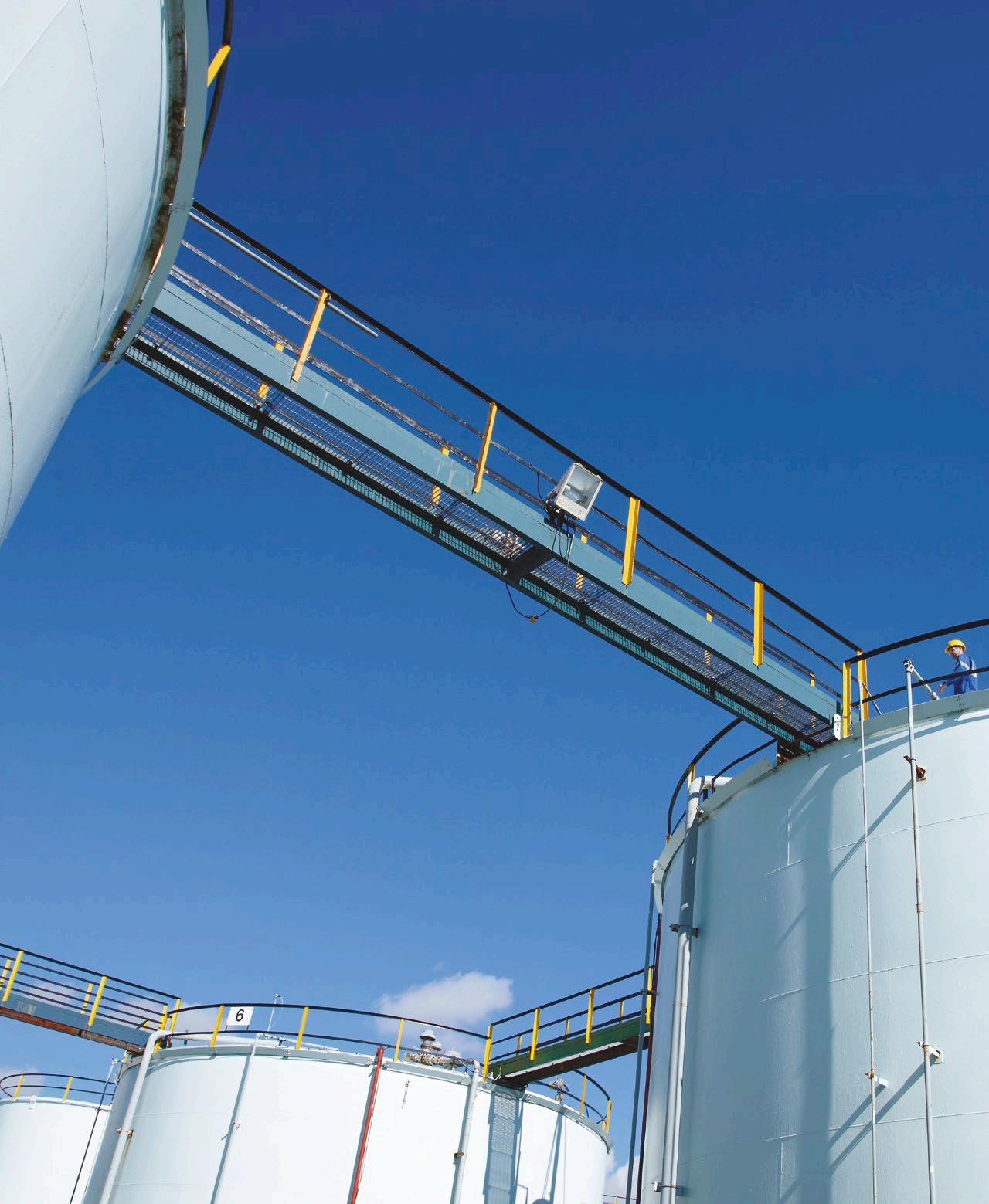
Vic said: “I am delighted to be joining UM Terminals as Commercial Director. The business is at an exciting stage with an ambitious strategic growth plan. I have also been hugely impressed by the culture, customercentric approach and can-do attitude of the company since I fi rst joined as a consultant in November 2019.”
Bryan Davies, Managing Director of UM Terminals, said: “Vic’s appointment is an important one for our business and I look forward to continuing to work with him to create and develop a range of exciting customer partnerships. Our strategic plan includes maximising our UK capability, harnessing the assets of the wider UM Group and looking for potential acquisition targets that are a good fi t.”
The company, which employs 63 people, rebranded from UM Storage to UM Terminals last year to better refl ect the range of services the company off ers its clients. It is part of the UM Group which has a distinguished history stretching back almost 100 years.
UM TERMINALS REPORTS STRONG DEMAND FOLLOWING REBRAND
UM Terminals’ Managing Director, Bryan Davies.

U
The business says that a combination of commercial confi dence returning post-Brexit and the positive eff ect of a rebrand in September last year has helped drive an infl ux of new enquiries. The enquiries have come from a combination of major blue-chip organisations and smaller customers seeking solutions to support their requirements for storage. The positive start to the fi rst half of 2021 means that the team at UM Terminals is also on track with the roll out of its own strategic growth plan.
The plan, announced to coincide with last year’s rebrand and launch of a new company website, consists of three main pillars.
Firstly, to maximise its existing UK capability both in terms of current assets and, where appropriate, expanding existing terminals. The second pillar involves optimising the assets of the wider UM Group and its network of facilities in Europe and other parts of the world storing molasses but which could be used to store other products.
The third pillar concerns looking for appropriate acquisition targets that would complement the current UM Terminals off er.
One of the company’s biggest selling points is its adaptability, a willingness to problem solve customers’ individual requirements where it is possible. This has been demonstrated recently with some of its new clients where the team has carried out major tank modifi cations to ensure it is able to continue providing best-in-class facilities.
This, in turn, requires a focus on partnership, not only with customers and suppliers but also with leading port operators, Peel Ports, Associated British Ports and Port of Bristol where UM Terminals’ tanks are located.
Bryan Davies, UM Terminals’ Managing Director, said: “We have been delighted with the progress we have made since undertaking the rebrand of the business and the launch of our new strategic growth plan in September last year.We have been able to secure several prestigious new clients and also continue to grow our relationships with other existing clients. The backbone for this success is undoubtedly the continued investment,
worth many millions of pounds, that we are making in ensuring our facilities are of the highest possible standard. We are also proud of the fact that we have all of the various licences and accreditations that are necessary to be able to store such a diverse range of products”.
UM Terminals operates out of 8 terminals, strategically located across the UK, handling over 40 diff erent products for our customers. It currently has a capacity of over 300,000 cubic metres of bulk liquid storage, but the plan is to grow this to over 400,000 cubic metres. Product solutions include vegetable oils, industrial, food and feed, chemical, fertiliser, fuels, biofuels and base oils.Services include blowing, blending, heating, processing and sampling among others.
Other recent key developments have included the appointment of Vic Brodrick as the company’s Commercial Director. Vic, who took up his new role in May, previously worked as a consultant with responsibility for sales strategy. Vic has an extensive background working in senior roles in the oil, aviation and shipping and logistics sectors including spells with Essar Oil, Peel Ports and Peel Airports.
The company’s innovative Client Central Services team has also continued to go from strength to strength, providing customers with a wealth of important information including real-time data to make critical business decisions. Based out of UM Terminals’ Regent Road Terminal in Liverpool, the service integrates all weighbridge and administration from across UM’s 8 terminals.
A dedicated portal gives clients instant access to essential weighbridge
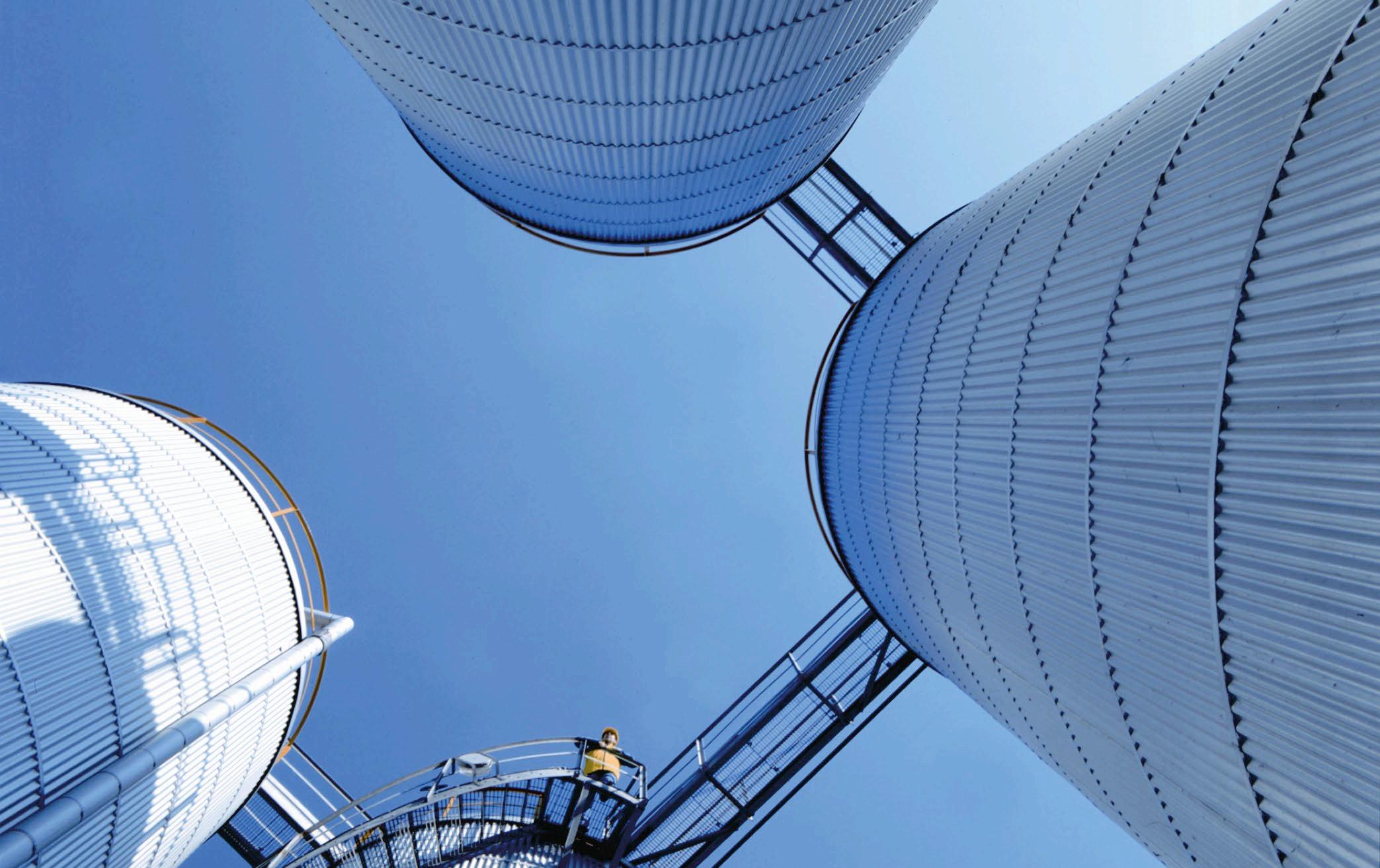
Photo credit: UM Terminals
documentation and current stock levels for each tank. They also have a secure log-in and can access their data 24/7, 365 days a year via a desktop, tablet or mobile device.
Further investment in smart working practices and industry-leading technologies is planned over the coming months, benefi ting both customers and the UM Terminals’ team.
One other interesting development has been the increase in the number of enquiries regarding biofuel storage, a trend the business is monitoring closely in the expectation that the hydrocarbon economy will shrink over the next decade. UM Terminals employs over 50 people, working 364 – sometimes 365 days – of the year meeting its customers’ needs. The company is a key part of today’s UM Group which has a distinguished history stretching back almost 100 years. UM’s founder, Michael KroyerKeilberg, was involved in bulk liquid storage even earlier than this – he constructed his fi rst tank for the storage of bulk molasses in 1911 at Victoria Dock in Hull.
The Group’s other services include the international trading of molasses, the sales and distribution of molasses and the procurement and marketing of vegetable oils for use in the animal feed industry. Bryan Davies added: “When we implemented our strategic growth plan last year we were in the midst of the Coronavirus pandemic and still uncertain about the likely impact of Brexit on our customers. Thanks to the hard work, commitment and dedication of our team, the ongoing investment in our business and the loyalty of our customers, we remain on track with our growth plans and with further innovation and expansion in the pipeline.”
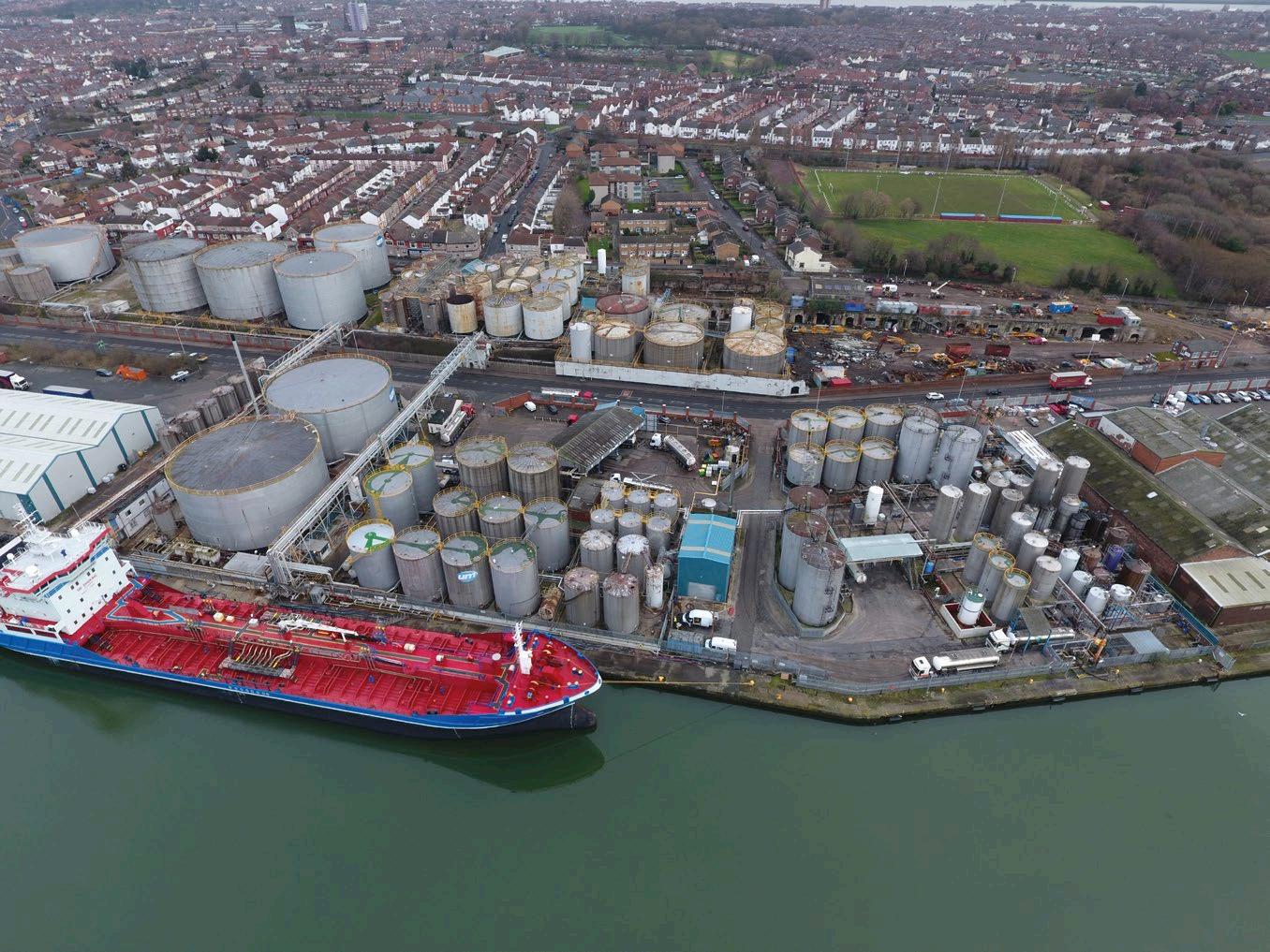
Lubricant Expo will now take place on 6 – 8 September 2022, at Messe Essen, Germany
The inaugural Lubricant Expo will now take place on the 6 – 8 September 2022. In response to unprecedented interest from the industry and key customer groups, we are pleased to announce that Lubricant Expo is now extending to be a 3-day event, expanding in scale and scope to include a larger exhibition hall that will welcome 200+ exhibitors within a bigger area for customers and suppliers to connect. A multi-track conference serving key market sectors with more sessions and speakers will extend over the new 3-day format, off ering suppliers and visitors greater time to network, enhance their knowledge and fi nd the solutions they need.
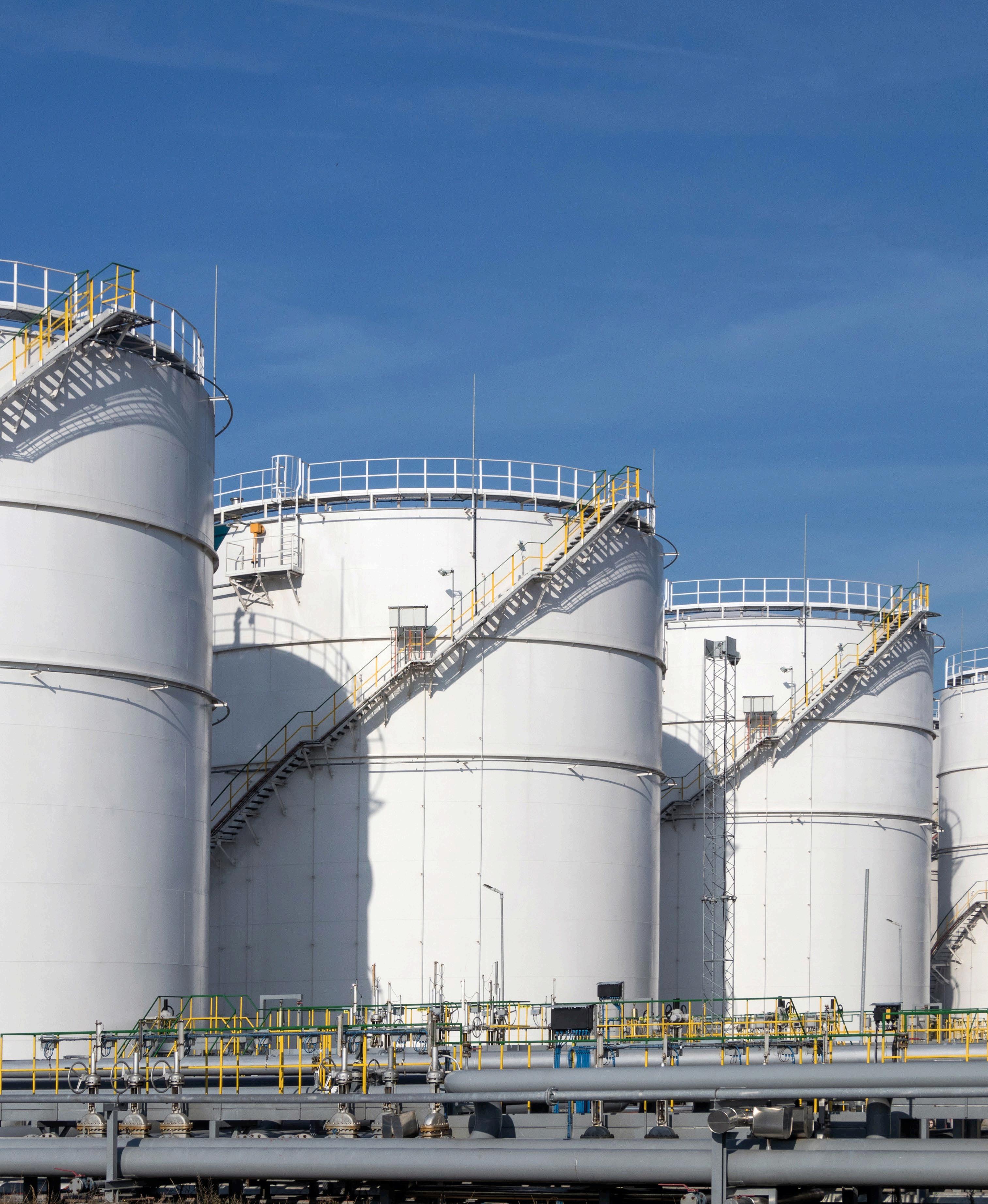
The show has already attracted signifi cant interest with support, exhibitors and speakers confi rmed from leading organisations. Paul Hooker, Event Director at Lubricant Expo says “We have been delighted with the response and support from the industry since Lubricant Expo launched. Moving the event to September 2022 means we can now host a larger event, unlocking further opportunities for participants and visitors by creating a bigger exhibition space that can welcome more suppliers and an expected 4000+ visitors from around the world, creating a truly unmissable international event for the lubricant industry.”
Lubricant Expo brings together the lubricant community and its customers with a free-to-attend exhibition and conference, providing visitors with the knowledge and suppliersthey need to reduce costs, improve effi ciency, progress development and maximise the performance of their products and equipment.
To know more, visit https:// lubricantexpo.com/
GREENERGY’S ONGOING COMMITMENT TO INNOVATION
W
ith an ongoing commitment to innovation, Greenergy has grown to be an established supplier and distributor of transportation fuels by consistently providing customers supply resilience and a customer service team who are available 24/7.
As the UK’s only national supplier, Greenergy operates strategic infrastructure in key demand locations, with over 25 supply locations across the country, including nine ownedstock managed terminals on the Thames, Teesside, Clydebank, Cardiff and Plymouth. Through its access to strategic infrastructure, Greenergy has developed unique global supply chains to deliver fuel to its customers. Originally founded in the 1990s, Greenergy identifi ed an opportunity to supply low emission diesel because of its signifi cant air quality benefi ts. This commitment to sustainability remains core to Greenergy as it continues to invest in renewable transport fuels that reduce carbon emissions from transport fuels today.
As the world looks to decarbonise the transport sector, the role of petrol and diesel fuels remains until other aff ordable alternatives are widely adopted. The most eff ective way to reduce carbon emissions for existing transport fuels comes from the blending of biofuels in petrol and diesel today. With rising biofuel obligations, Greenergy is now able to supply customers with high percentage biodiesel blends such as B20, that include 20% biodiesel over the course of the year compared to standard grade diesel that is up to 7%. This provides a cost-eff ective and sustainable lower carbon fuel option for existing diesel vehicles, avoiding the need for signifi cant capital outlay.
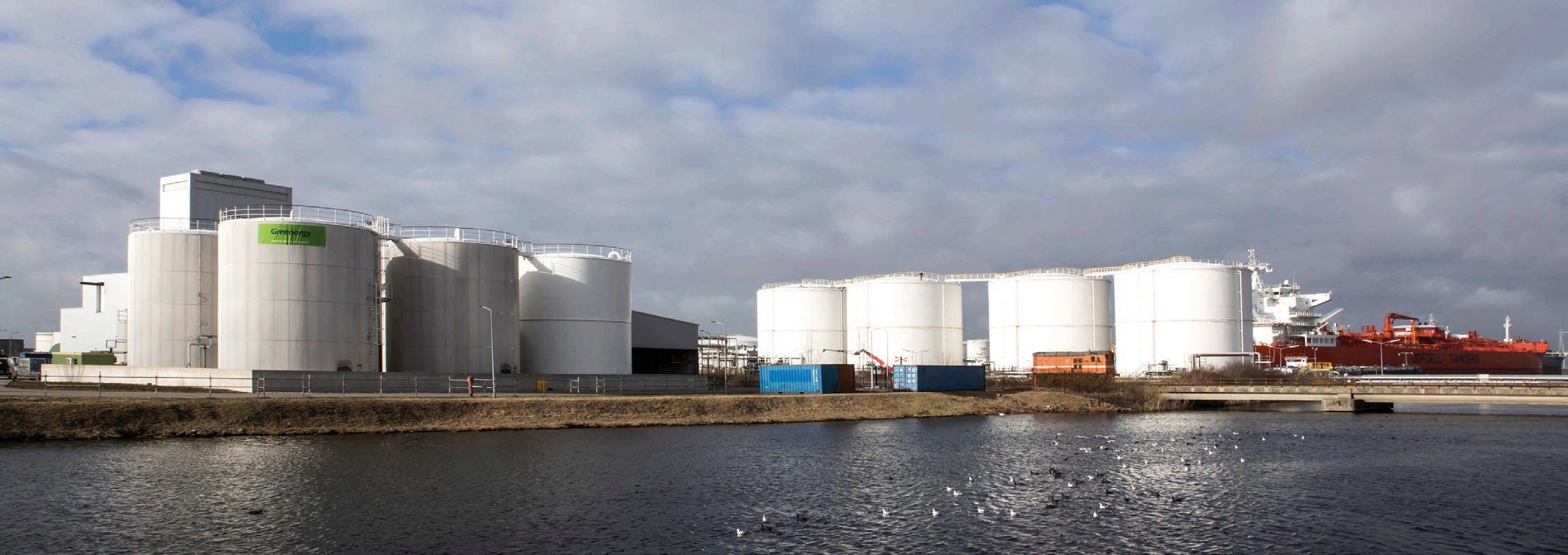
To meet the needs of its customers, Greenergy has now grown to be the largest manufacturer of wastebased biodiesel in Europe, with two plants in the UK and a third located in Amsterdam. Greenergy continues to expand its manufacturing operations to meet the growing demand for biofuels, with a focus on effi ciency and reducing emissions from its own operations.
Recognising the need for further innovation, at the start of 2021, Greenergy announced a new renewables project that uses proven technologies to transform waste tyres into advanced biofuels that can be blended into transport fuels. As part of UK legislation, a growing percentage of biofuel must be classed as development fuel – made from sustainable wastes and residues with a greenhouse gas saving of at least 65%. This project, when complete in 2025, will meet this requirement.
Paul Bateson, Chief Operating Offi ce at Greenergy, explained: “We recognise the urgent need to further reduce emissions in the transportation sector. As a leading manufacturer of waste-derived biodiesel that delivers greenhouse gas savings of 81% compared to mineral diesel, we are continuing to invest in the development, production and supply of liquid fuels from renewable sources to help lead our customers through the transition to a lower carbon future.”
Recognising the need for further innovation, at the start of 2021, Greenergy announced a new renewables project that uses proven technologies to transform waste tyres into advanced biofuels that can be blended into transport fuels.

For more information, visit www.greenergy.com
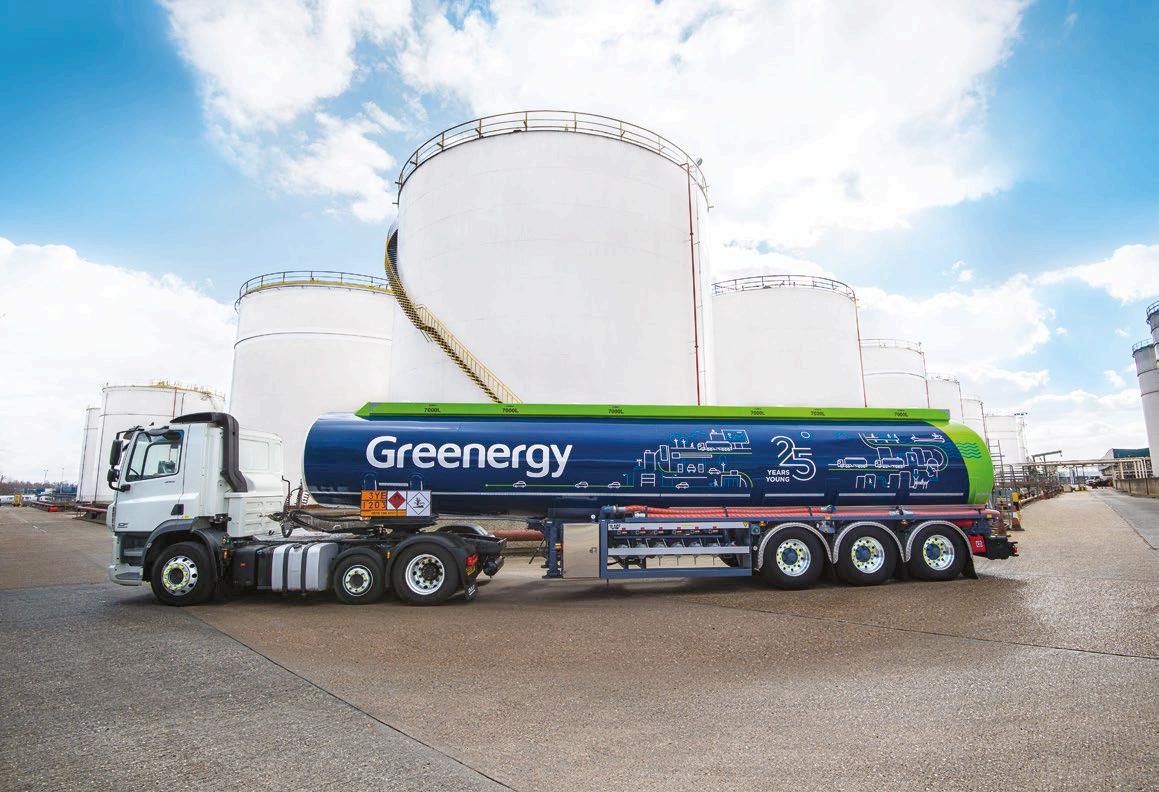
IN CONVERSATION WITH IAN TRAVERS
Ian Travers, Director of Ian Travers Limited, talks to TSA’s Executive Director, Peter Davidson
Ian Travers, Director, Ian Travers Limited

P
Peter is Executive Director at the Tank Storage Association responsible for developing and promoting excellence in risk management in the sector and for leading engagement with key government stakeholders and regulators. Prior to joining TSA Peter was Safety, Commercial and Projects Director at UK Petroleum Industry Association. Peter was a pivotal member of the Buncefi eld Standards Task Group, the joint industry and regulator body responsible for improving safety in the fuel storage sector. His early career was at ABB as the Regulatory Compliance Manager.
Ian
Peter, welcome. Thank you for chatting to me. I’m looking to encourage and promote process safety, particularly with new engineers and people new to process safety so that they see it as an important aspect of their career. I invited you to take part because you’ve been very infl uential to me. We walked a very dodgy path together following the Buncefi eld major accident to get industry and regulators united and on the same track and signed up to never let that sort of incident occur again. I’m very grateful for all of your hard work over the years.
I just wanted to chat to you about what brought you to be one of the major infl uences in UK health and safety high hazard sector? How did you end up here?
Peter
A key role in risk management was not what I was expecting. I started out with ABB, very large Swiss/ Swedish engineering company as an automation engineer designing control systems. That’s really where it started, because I was designing control and safety systems for highly regulated industries. Most of my work was in the pharmaceutical sector, but also nuclear - working on many projects at Sellafi eld. So, there was always this idea of a very detailed commitment to understand the processes to design the software to ensure that we built in inherent safety. And that was where I expected to be now, but then the Buncefi eld event happened.
I had the opportunity to work for a Trade Association, the UK Petroleum Industry Association, UKPIA, to represent the interests of downstream oil, primarily the refi neries and a number of terminals. At the time
Ian Travers Limited www.iantravers.co.uk
the sector knew they needed to do more on process safety to implement the fi ndings from the Buncefi eld Standards Task Group. That’s really why I made the switch. But did I expect to be here? No!
Ian
When you were doing that complex technical work with ABB, what was your mindset? Was it that this has got to be right, because there’s no room for error or there could be a catastrophe?
Peter
It is very infl uential. I have always been one of those folks that like things to be written down, very clear and unambiguously. That has really driven me to be noticeably clear about the way in which process safety systems and information should work. The reasons underpinning control system design and guidelines need to be accessible and easily understood. If people understand what the diffi culties are, or the challenges associated with a particular process or environment, the more likely it will sink in and they will understand the need for control.
Ian
What excites you about your work?
Peter
It’s bringing together people from diff erent backgrounds, companies, and sectors to fi nd common solutions to problems. There are very few problems in our industries that aren’t fi xable. It just takes time and commitment from all those involved to try and fi nd a good workable solution. The excitement comes from when you fi nd those solutions, particularly if they are simple, easy to understand and to implement. We have an amazing capacity to unnecessarily overcomplicate safety.
Ian
In the last 10 or 15 years, what do you consider the most important improvements in risk management which delivered on the ground benefi ts?
Peter
It’s this concept of greater collaboration and communication between businesses, but also with regulators. I don’t think that we had the same relationship with our regulators 15 years ago as we do today. There are peaks and troughs, but we have a far, far more collaborative approach. It isn’t adversarial, either with a regulator or between businesses within a particular sector. There’s a willingness to try and work more closely together to solve some of the problems that we share and a realisation that, anything that happens to one is going to impact us all. Which is clearly what we saw from Buncefi eld and many other incidents before that.
Ian
Does your voice get heard, and are the views of industry taken seriously?
Peter
Yes, anyone who’s involved in these discussions, and the work that goes on as part of those discussions must be prepared to put in the eff ort. When businesses, regulators or trade unions and other stakeholders, see individuals and organisations putting eff ort into genuinely trying to improve, people do take notice. It would be diff erent if all we did was wave the red fl ag and complain about everything. I’m pretty sure that regulators know we will be the fi rst to put our hat in the ring to work on guidance development, data gathering or analytics for our sector.
Ian
Do you see a similar collaborative approach outside the UK across Europe?
Peter
We have a unique and excellent model here in the UK. I talk to my European colleagues regularly about process safety. I don’t see the same approach and there is far more prescription across Europe. An approach that, provided you follow the standards and tick all the boxes, then that’s all you need to do. There doesn’t seem to be the concept that you need to think out of the box about what could go wrong. I
think that’s changing slowly. But it is a slow change, even convincing my European colleagues to start sharing common process safety performance indicators has been a challenge that I’ve been battling for fi ve, six years now. And we’ve still not achieved it.
Ian
Building on that, do you fi nd companies that operate both in the UK and across Europe can behave in those diff erent modes? Does that infl uence how they interact with the regulator as well? For instance, more open and connected in the UK, but more circumspect and cautious when talking to their local European regulator?
Peter
They will adopt the attitude that’s demanded by the regulator in that geographical region. However, with respect to process safety programmes, and process safety management within those organisations, they tend to adopt a consistent model and standards across all their business areas, regardless of the country they are operating in. From my experience that’s the UK model.
Ian
How do you think regulators could improve both in the UK and elsewhere?
Peter
Two words, clarity, and consistency. Therefore, I’m a big supporter of initiatives such as the UK Chemical and Downstream Oil Industries Forum, CDOIF. It’s one mechanism that we all have to try and provide that consistency and clarity. We don’t always get it right, but it really does promote understanding between both regulators and duty holders.
The regulators have a diffi cult job which is becoming increasingly more diffi cult with increased responsibilities such as UK REACH and acting as the new Building Safety regulator. This is a huge draw on resources and expertise. That is why working more collaboratively with industry and other stakeholders is the right way to go.
Ian
Put the shoe on the other foot. What do your colleagues in industry get wrong?
Peter
I see an ever-increasing reliance on third parties and consultants, without sometimes the necessary background knowledge to act as an intelligent customer, for a whole series of important issues such as functional safety, cyber security, human factors. Companies may not have the expertise in-house, they rely on third parties and consultants, there is no problem with that, but they still have a responsibility for the outcome and approach. This comes back to my point about our capacity to overcomplicate things and why we need to simplify when it’s appropriate. Many of these topics are not diffi cult, and they shouldn’t be. But unfortunately, sometimes people like to overplay what some of these things mean. We use far too much jargon when we just want to say a simple thing.
Also, regulators need to understand the challenges businesses face within specialist topics. It’s fantastic having a specialist Inspector going to a site looking in great depth at say functional safety. But inspectors need to take a broad view as well in terms of what’s actually important at a facility in managing the risk appropriately. That may not be a line by line understanding of for instance, IEC 615 11.
Ian
What’s your big fi x – what would you like to see improved?
Peter
I would like greater recognition by Government that our ways of working and management of risk is something that we should be proud of and that UK Government actively
encourages. I think that would provide the incentive for far more people to become more engaged.
Ian
Let’s move off the technical issues and share something about you as an individual. What are your hobbies?
Peter
Fortunately, I’m standing in front of my whisky collection. I’m very much into Japanese whisky at the moment. I also still like my cars, my motor racing, of course my dogs and my secret hobby tropical fi sh!
I’ve always admired my dad who’s no longer with us. He was head of instrumentation and control at British Gas. I always remember he had the same outlook as me, which is to make things as simple as you can and try and communicate things as clearly and concisely as you can. I try and live by those rules.
Ian
What advice would you give to yourself aged 18?
Peter
Listen more. There are periods in your life, whether that’s in your personal life or in your business life, when you just need to shut up and listen and think about the response you’re going to give to a particular question or a query. The more that we learn to do that, the better we will be at working closely with people.
Ian
What do you think the kind of big advances are going to be in risk management and risk thinking in the next 10 years?
Peter
More and more automation and artifi cial intelligence, including augmented reality in training and competency. The Coronavirus pandemic has accelerated this trend. There’s no reason why this shouldn’t be. The key point is being an intelligent customer for this technology. If you really don’t understand your fundamental risks, that’s a big worry - I don’t have an issue with automation providing we don’t relinquish our responsibilities to manage those risks.
Ian
Any parting thoughts or insights that I should have maybe raised that you?
Peter
We need to have a conversation about the people. We often focus on graduates. When it comes down to safety on the ground, we rely on people who don’t have degrees, but who are nevertheless vital to safe operations. Sometimes we need to recognise that front line workers are just as important, if not more important, than the folks that are designing plant and processes in the offi ce. I hope we are going to see apprenticeships as being far more important in the future. I’d like to see a future in which people with front line experience can infl uence safety within organisations at all levels.
Ian
Peter thank you. As I anticipated some fantastic insights and thoughts from you. When it comes to process safety, consistency and clarity are key.
Author
Ian Travers is a world expert on process safety management, leadership and the establishment and implementation of key performance indicators for major hazard industries. He also holds the Institute of Chemical Engineers’ Franklin Medal for his outstanding contribution to Process Safety. https://www.iantravers.co.uk/
ISOLATING THE BENEFITS OF ISO 9001
Reynolds Training Services have achieved the prestigious ISO 9001:2015 Quality Management Systems certifi cation. A
t Reynolds Training Services, we are delighted that we have achieved the prestigious ISO 9001:2015 Quality Management Systems certifi cation.
John Reynolds, founder and Managing Director of Reynolds Training, acknowledges: “This accolade is a testimony to the hard work done by our team, and it is a refl ection of our commitment to continually strive to improve standards. We do this in our own business and, through the courses we off er, we can help make real improvements in standards throughout industry.
This certifi cation assures customers and partners that when they are working with Reynolds Training Service they are working with a trusted quality-conscious company.
1 About the ISO 9001:2015
Quality Management Systems certifi cation
ISO 9001 is the internationally recognized Quality Management System (QMS) standard that is designed to be a powerful business improvement tool.
This mark of trust is the world’s quality system of choice with over a million organisations around the globe improving their operations with this management system standard.
At Reynolds Training, our ISO 9001 certifi cation helps us to continually monitor and manage quality and identify areas for improvement.
As a company, we continue to evolve and adapt in a changing world. We have also striven to continually improve our training delivery, including the assets and resources we utilise.
This accolade is a milestone for us, demonstrating our commitment to growth and ongoing improvement, as well as showcasing our assurance that our courses are operating to the highest quality standard.

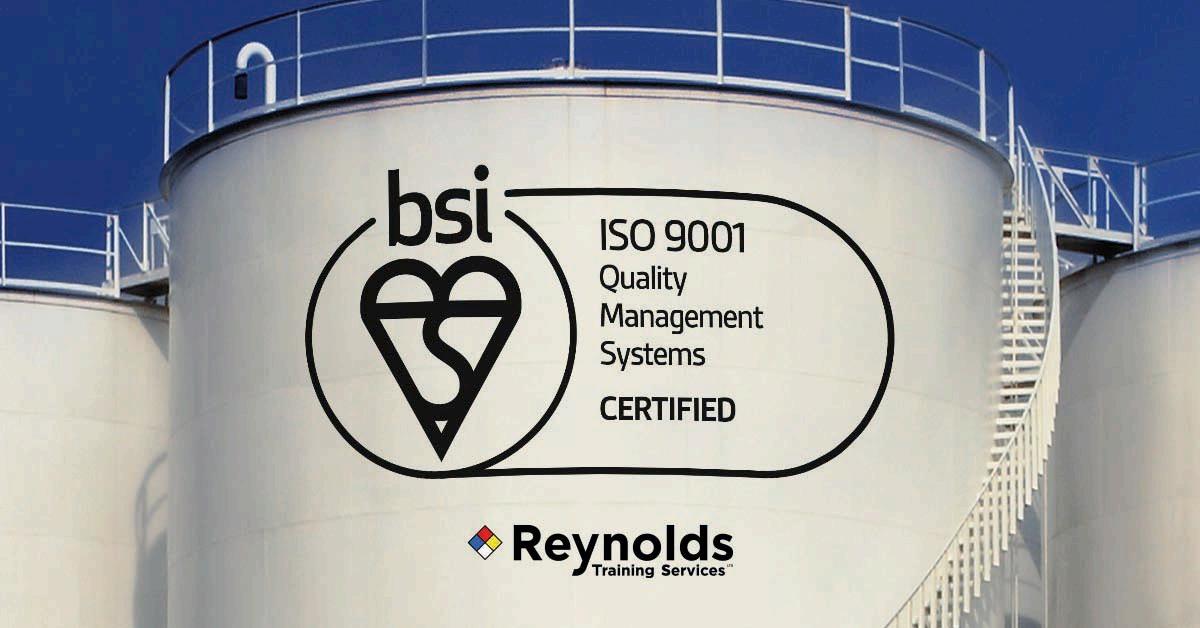
ISO 9001 demonstrates compliance to internationally recognised standards and is a clear signal to our clients, delegates and stakeholders of our long-term growth and improvement.
2 Continually improve, streamline operations and reduce costs
Embedding ISO has driven us to better develop our wider business and management processes and to link this to continuous improvement - which will, ultimately, have farreaching benefi ts for our learners and their employers. One of the fundamental aspects of ISO 9001 is focussing on the customers and clients, understanding their requirements and exceeding their expectations. This is reinforced by a continual review and improvement process. This accreditation of our Quality Management Systems endorses the effi ciency, productivity and commitment to continual improvement we provide for our clients.
Our learners and their employers will continue to benefi t from the quality learning we have developed. Alongside our ISO accreditation, we have developed (and continue to develop) structured processes to manage career progression
The business benefi ts of this are selfevident: a well-trained workforce with great career prospects is a happy workforce and a happy workforce is far more engaged, motivated and productive. Everyone wins!
3 Reduce risk
Planning for, mitigating against and managing risk is something that
we, at Reynolds Training, are passionate about and instil in all of our learners. We believe that all employees - from the management suite to the shop fl oor - should feel that it is their responsibility to be vigilant about risk.
Identifying, preparing-for and avoiding mistakes, accidents (and even surprises) is an essential part of running any successful business, none more so than businesses in the high hazard sector where both process and personal safety are paramount.
As the ISO says in its guidelines of requirements for this QMS: “Riskbased thinking is essential for achieving an eff ective Quality Management System”.
4 International prestige
One of the principal benefi ts from achieving and maintaining this trust mark is the prestige it grants an organisation. As the leading training provider for the Bulk Liquid Storage Sector, this seal of approval will enable us to drive forward into new markets, working productively with new partners and clients, not only in the UK but around the world; providing them with the benefi ts of our integrated package of training and competence assessment.
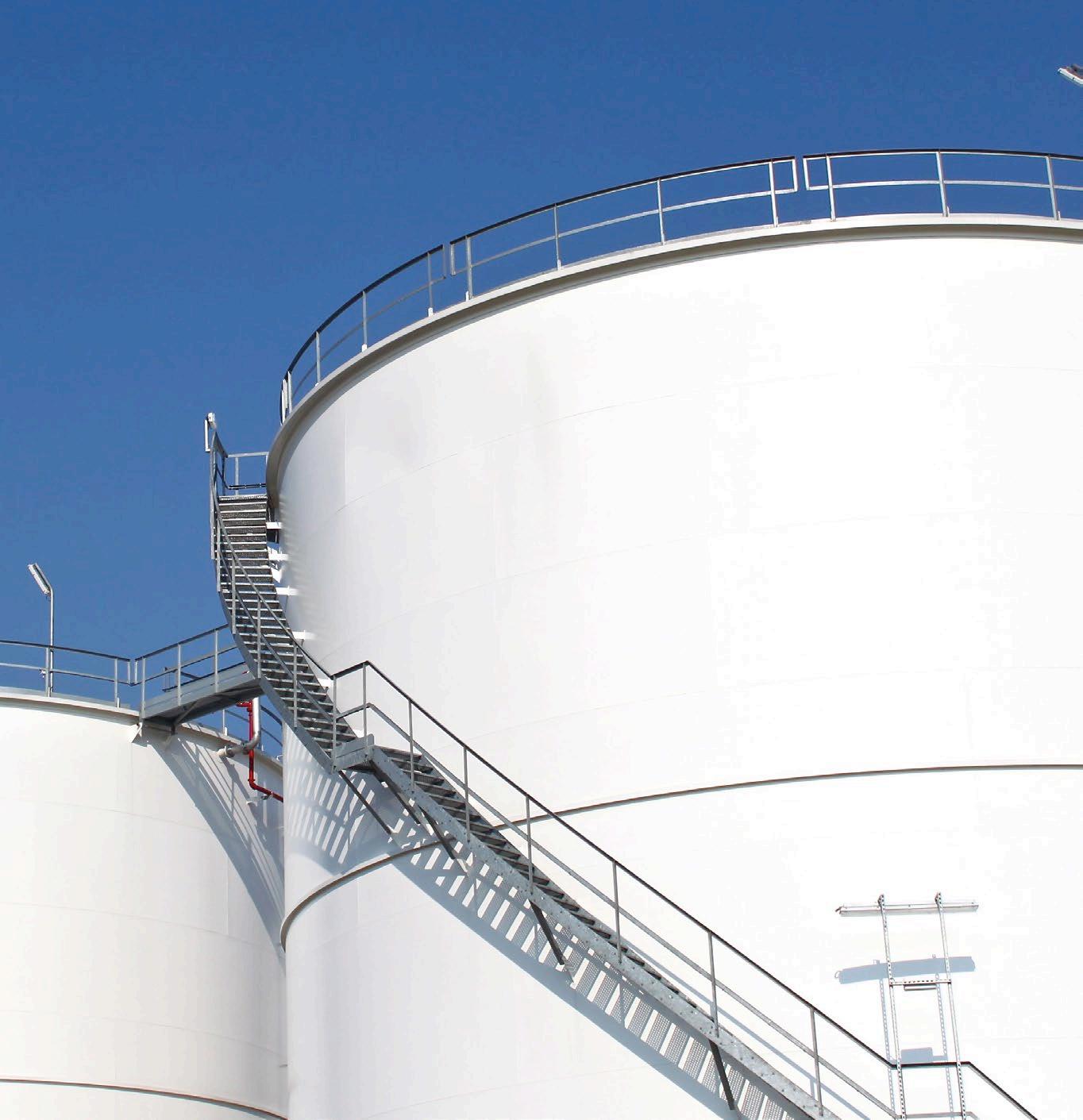
Reynolds Training Services achieves IChemE level 3 apprenticeship qualifi cation approval
TSA’s associate member Reynolds Training Services has had its qualifi cation approved by the Institution of Chemical Engineers (IChemE) – the fi rst level 3 diploma to be approved by IChemE. Approval has been awarded for Reynolds Training Services’ sector leading Bulk Storage Operator Technician level 3 diploma, which is part of a twoyear apprenticeship off ering a wider focus on process and occupational safety, human factors and emergency response, aligning these elements with technical operations. The programme is a mix of vocational and academic learning delivered in conjunction with HETA (Humberside Engineering Training Association) at Reynolds Training Services who are based at the CATCH Training facility in Stallingborough, North East Lincolnshire. An apprenticeship is made up of a qualifi cation and a programme of vocational experience. IChemE is licensed by the Engineering Council to approve either or both of these parts for colleges and training providers delivering an engineering apprenticeship. Having this qualifi cation approved by IChemE provides a new route to technical recognition for the sector, meaning that apprentices can go on to the professional Engineering Technician (EngTech) qualifi cation. The IChemE assessors commended Reynolds Training Services for their outstanding simulation facility of a full-scale tank farm that off ers a realistic, professional environment and which provides trainee engineers ample work-based experience in real-world problem-solving and risk assessment for major accident hazards. The assessors also praised the course leaders for teaching the process safety fundamentals at an exceptionally high standard.

To know more, visit https:// reynoldstraining.com/

Join the voice of the bulk liquid storage sector
TSA champions the UK’s bulk liquid storage sector and its role in supporting growth and prosperity.
We have several membership levels available for bulk liquid terminals, distribution terminals and hubs, as well as equipment and service suppliers.
Join us. Choose your membership at www.tankstorage.org.uk/join-us

TSA offers a range of membership benefi ts, including weekly political and media updates sent directly to your inbox.
